#that gives you a lot more freedom to like. demonstrate your point rather than being like 'my thesis is...'
Note
sorry if this is a weird ask, but i was thinking of jolymes today and was wondering what you think attracts jolyne to hermes/what she loves about her? (though i absolutely love them together, it feels easier to come up with answers for the other way around, and i've realized that all of my favourite jolymes fics are written from hermes' POV) (you're one of my favourite writers for them (and foolymes) so i figured i'd ask!)
Anon, I am SO sorry to be answering this uhhhh 3+ months after you asked--the semester started and I low-key died and am still kind of dead but HERE WE ARE!!! 3+ MONTHS LATER!!!! And I maybe have answers???
I realized that I've only written one fic that's definitely from Jolyne's PoV ("Contact" is...either alternating or semi-omniscient--definitely not what I normally write) which I WILL fix someday (when I have more than zero energy and my やる気 returns from the war). Anyway, some scattered thoughts, with the caveats that 1. I feel squidgy writing "proper" meta and generally am much better at conveying thoughts about characters via fic and 2. what is attraction? we just don't know. But HERE WE GO:
Hermes is just like...way more prepared than Jolyne. Not only in the "knows what she's in for when she gets to prison" way, but also Hermes tends to be a lot more...deliberate, especially in the fights she picks. (Thinking about Kiss of Love and Revenge, as I always am.) I love Jolyne, but her brain is usually moving half a second in front of her body, whereas Hermes definitely can and does plan ahead. (Some fics cast Hermes as "the stupid one," but she is absolutely not.) Competence can be VERY attractive.
Hermes's loyalty and protectiveness. I feel like this is an obvious one, but the fact that Hermes immediately sees Jolyne and goes, "oh, this kid has no idea what she's in for" and tries to help in whatever limited way would make an impression on Jolyne! And the fact that she again IMMEDIATELY decides to help Jolyne when she goes searching for Jotaro's disc. Also the fact that Hermes TRUSTS Jolyne--deferring to her decision re: trusting F.F., for example. When Hermes decides to care about someone, she is dedicated (in a way that Jolyne is probably noooooot used to, given her life experience up to this point, and probably finds both amazing and a little overwhelming).
I feel like I have sort of written about this sideways a couple of times, but I think that Jolyne sees Hermes's loyalty to Gloria (when she eventually finds out about it) both as something admirable and as something that she can't quite grok. (Jolyne also doesn't really understand their relationship because Hermes won't/can't explain a lot of it, which doesn't help.) (Sorry I am thinking about Hermes & Gloria always. Join me in the pit.)
Hermes has had a pretty wildly different life arc and life experiences than Jolyne--I don't know if that's attractive, per se, but it is definitely something that both intrigues Jolyne and winds up being a gap in her understanding of Hermes. But also it means that there's definitely an extent to which Hermes is a LOT more mature than Jolyne in some respects at the start--although Jolyne catches up along the way.
Related to that point, Hermes is MUCH more settled into herself/knows ("knows") who she is and what she wants than Jolyne at the beginning of the arc. And I do think that that winds up changing over the course of the arc, but that's another thing that Jolyne would definitely notice: the extent to which she is very much still growing into herself/figuring out who she is in the world whereas Hermes is Certain She Knows Who She Is. Again: people who are self-confident can be very attractive! Especially when you're not quite sure of yourself. I think this is also maybe a queer thing, where you see someone who is very comfortable being themself and you're like, "oh dang." (There is a reason that I tend to write Hermes as MUCH more settled into her queer identity than Jolyne.)
she's hot. I feel like that's obvious but I will say it. buff girl hot
traumabonding. it's a thing.
...hopefully that's enough to get you started because writing meta makes my blood run backward.
(oh my god it's so obvious that I'm ace reading this, I am so sorry, there's a reason that all my revision notes for ship fics start with "what is attraction? we just don't know" or "make them actually attracted to each other")
#ask Queenie#truly a miracle that I have ever managed to write ship fic that was convincing to anyone wwww#anyway I reserve the right to write Jolyne PoV fics in 1-5 business years and be like#'oh duh I forgot this really obvious part of the dynamic'#I shouldn't find writing pure meta as anxiety-provoking as I do but there's something about the confines of a fic#that gives you a lot more freedom to like. demonstrate your point rather than being like 'my thesis is...'#parallelism palooza: the journey
5 notes
·
View notes
Text
The Emperor is more interesting and nuanced than people seem to give it credit for and I want to ramble about it in a spoilery way.
By the end of the game, I do not find The Emperor and its motivations any great mystery. It is shifty and dishonest about a lot of things, but its desire for a real companion seems genuine. The companions it had from its previous life could not accept it as it was. Stelmane thought it was a freak. Ansur literally thought it should die rather than continue to live, for the crime of being different than it was before.
Can you imagine that? Your best friend telling you it would be more noble for you to die than live as yourself?
I think the list of people the Emperor chooses to protect from the Absolute makes a lot of sense if you consider that it would be seeking people who could, under the right circumstances, accept it for who it is. Most of them have experiences not totally dissimilar to being consumed by a hive mind, and a few of them have experienced being scorned by their loved ones for reasons that could be described as simply not being who their loved ones expected.
It could not be loved by those who understood Balduran. Perhaps it could be loved by those who understand the Emperor.
My opinion is that this is the Emperor's primary motivation in the game. It does not demonstrate a principled belief in any of its other goals. Why fight the Absolute? Because freedom is better than slavery, surely. But the Emperor does not seem to value this notion very highly. It enslaved Duke Stelmane and seems to think this fact reflects well on it. It threatens you with enslavement and rape if you insult it. It will even choose to fight alongside the Absolute if you choose to make your own plan instead of going with its own.
In the long view of the game, I think of the Emperor as a sort of evil hero. If it woke up tomorrow in the mood to create a legion of thrall, it would. This would come with its own set of instrumental goals totally seperate from the actions it takes in game, but that's just because that is a different terminal goal. Right now, its terminal goal is a companion who will authentically love it as its true illithid self. This means opposing the Absolute, but it also means lying to, gaslighting, and grooming you and your companions. In its own sociopathic way, this is love.
I also want to shout-out the scenarios where the Emperor digs into your mind without consent as well. Even if you're the perfect illithid gf who eats all her tadpoles and never does anything without consulting your daddy first, the Emperor still doesn't trust you because it still doesn't respect you. It does not truly care about you as an individual. It just doesn't want to be lonely as the only Illithid like itself.
(I believe Omeluum's purpose in the narrative is to demonstrate that this isn't just a free Illithid thing. These are character traits of the Emperor specifically.)
But yeah I think it's more complicated than either "the Emperor was a good guy" or "the Emperor never cared about you at all." The Emperor wants to be loved. It wants that love to be real. It couldn't get either of these things from Balduran's companions, so it tries a different approach with you. But this love is ultimately selfish to a point that slavery and rape is an acceptable second option.
35 notes
·
View notes
Text
I’m not worried about Imogen.
It’s probably no surprise that I think that expecting Imogen to go evil at this point, or even to consider it, is a misread of her character. I think there’s something very much missing from conversations that try to parse where she’s at, what her questioning of the worth of the gods means, through a lens of a fight the Vanguard/join the Vanguard binary. It’s actually incredibly strange to me not to see this mentioned more since it is like, one of the cornerstones of Imogen’s arc.
Because the one thing Imogen’s mother has always told her is to run.
That’s been a through line of Imogen’s whole journey through her powers; she started getting answers when she stopped running from the storm, stopped listening to her mother. But before that? She ran in every dream. And as a highly anxious character, she’s also prone to getting too caught up in spiraling what-ifs to the point of not being decisive. So if we want to keep it simple, the question, I think, isn’t Oppose/Join; it’s Fight/Flight/Freeze. I think that’s the real temptation here for Imogen - not to JOIN the Verity, but to do as her mother has always told her, and run from this. From the responsibility of making the choice, from the pain of opposing her mother, from the fear of fighting Otohan again. If losing the gods isn’t THAT bad, then maybe she could live with inaction. We all know that the idea of the Hells as a party of NPCs is one the cast likes, and while Imogen is definitely less that in terms of story beats, a key thing is that she wants to be one. The freedom her mother showed her as a temptation was the freedom from her powers, yeah, but even more from being someone who is fate touched. It’s the freedom not to have to choose (which of course isn’t a freedom at all).
That’s part of why Imogen’s talk with Laudna is so damn important. Laudna, beyond recognizing how Imogen thinks and needs to talk things out - which, don’t get me wrong, that is SO SO IMPORTANT as well, and I could wax poetic on it for days - recognizes where Imogen’s struggle really lies. Laudna hammers on choice, not just because she wants Imogen to know that she supports her and trusts her, but because she knows that the real temptation here for Imogen is to run, to abdicate the choice. That’s the real power she’d give up, that’s why she says “don’t let them get in your head and make you think otherwise” specifically about choice, rather than anything about the character of the Vanguard’s mission. Laudna reminds her you always have a choice, and that that is a gift, that is real freedom.
I understand why people want to talk about Evil Imogen. It’s super dramatic. And I think we might have gotten it if dealing with Delilah was the only way to get Laudna back. But I also think that time’s past, and stuffing her reactions to her mother being a true believer in the cult into that mold requires either ignoring a lot of what Imogen has said or done throughout canon, or operating with an assumption that she is always lying about everything. And look, I think it’s important to note that every time the Vanguard has come up in any capacity, Imogen has reiterated her opposition to Ludinus et al and their methods. She’s done that immediately every time, it just gets forgotten because it isn’t an impressive speech on their morality like, say, Ashton’s. It’s easy to remember those speeches and think they must have been dunks on her, that she was arguing with them, but that’s simply not what happened.
The first time she showed any kind of sympathy for the Ruby Vanguard’s anti-god sentiment, it was simply because she felt bad about the idea of murdering Tuldus, because he had been abused in the name of piety. And so she….turned him over to the Verity to be further interrogated instead - not exactly a pro-vanguard action. When she spoke with Ludinus not long after they had discussed her potentially acting as a mole, she was demonstrably lying her ass off - saying her mother had been asking her to join them - so to take any comment from her about possibly joining them or being sympathetic as proof of a potential defection ignores the context. And when Ludinus left, she almost immediately said “we have to stop him, I have to find my mother.” Up until the point her mother pushes a vision with feeling into her brain, she was working on the assumption that her mother was caught up in something she felt trapped by, something she didn’t believe in - and she just wanted to get her out. And that vision pushed into her brain - immediately after she blurt out “what if it’s not that bad, what if we’re just fighting change-” Orym snaps her out of it, and she apologizes, says it was just overwhelming, that she wanted to see this through. She says Predathos is selfish, it just wants to eat. Nothing, nothing she says absolves the Vanguard of any crime, or indicates support for them.
You don’t have to care about the gods to oppose the Vanguard. Most of the other Hells don’t care much about the gods, either. I think Imogen’s word choice is interesting too, and feeds into my point. What if they’re just fighting change? She swears she wants to see this through. She asks Laudna if they want to do this. Those phrases to me imply that she’s wondering if they should just bow out of the fight, not swap sides. Those are phrases about whether or not to abort an action in motion, not to do an about face.
And I think it makes sense for Orym and Fearne to be misreading this struggle, too, because they are both people of action. Fearne’s action is more impulse,yeah, but it’s still action. And Orym is the man of duty, who doesn’t think of himself as a big player but can’t even really conceive of not answering the call to make heroic choices. He’s been steadfast in working towards a goal, and taking down these people who took his family from him is that goal. I don’t think in this moment he can quite conceptualize that running might be an option for any of them.
Imogen’s talk with Orym wasn’t about the gods. It was about what Orym fights for, and whether it’s still worth it. Imogen’s talk with Laudna wasn’t about the goodness or usefulness of the gods, it was about choice, and wanting a future. That’s significant. Imogen needed to crystalize why she should fight rather than run, to solidify her convictions so she won’t freeze.
I also think there are actually 3 key things that happened for Imogen in episode 49 that will keep her from running or freezing. Her talks with Orym and Laudna, obviously, but also? The fact that Keyleth is coming. Because up until Keyleth told them she was coming with the calvary? The choice wasn’t just between loosing Predathos, or ignoring it, or stopping it - it was also a choice between martyrdom and possible survival. Until that point, it had the makings of a suicide mission. 7 slapdicks and an untrustworthy Fey against an army, with a big clock hanging over their heads? When the cause is protecting gods you don’t much care about, and you don’t know for sure it will even result in anything that will hurt the people you care about? That will muck up the calculus real quick if you’re not keen to die. But now “It feels hopeful.” They don’t have to be martyrs, just part of the fight. Removing almost certain death takes some of the weight off the decision.
So I don’t think, personally, that there is any chance now of Imogen running, unless hope seems lost and that’s all they can do. I don't think there was ever a real chance of her turning. She might still freeze, when confronted with her mother as an enemy, but I think that’s lessened exponentially as well, thanks to Laudna. Hell, I’m not even real worried about Imogen getting charmed into fighting the other Hells because her psychic defenses gives her advantage on those kinds of wisdom saves. I’m not worried about Imogen. Go get ‘em girl. They don’t control you. You are the storm.
#critical role#cr meta#imogen temult#cr3#keep joking that I need to write like#a United Theory of Imogen Temult with timestamps and footnotes#(I'm not really joking lmao help me)#but I wanted to write out my feelings for cr3e49 before we hit 50#so as much as it feels like there’s no way I can say everything I want to right now#I am gonna just have to push through
76 notes
·
View notes
Text
Whoops I’m thinking about Them (Cas and Scourge) again - namely the rapidly shifting power dynamics that go on during the class story.
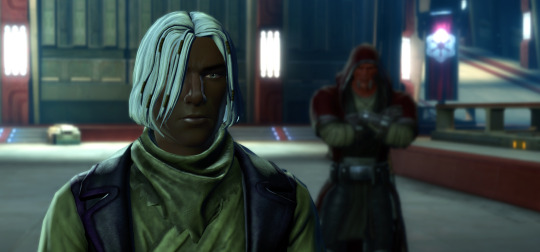
So on the one hand, we have Caspian, an only above-average Jedi in terms of raw power, not overwhelming by any means. In most universes, he openly shies away from power. Here in SWTOR, he is wary of holding it over others, trying to use his role and abilities as responsibly as possible; he almost never employs ‘Jedi mind tricks’ and similar techniques, only overriding a person’s will if the benefits vastly outweigh the ethical question of doing so. He’s also immensely uncomfortable with anyone having power over him; for this reason he tends to rebel against authority figures (see: the Jedi Council), and calls out any instances of power abuse that he comes across.
And then we have Scourge. A man of immense power, both in his abilities and his status as the Emperor’s Wrath; a man who is clearly drawn to power and who has no qualms about using it for his own ends. A man who says that to be Sith is to break your own chains, in essence to use your own power to set yourself free of everyone and everything that would control you. And a man who willingly set all of that freedom aside, allowing himself to be bound to and controlled by his greatest enemy for three hundred years as he sought to fulfill the vision the Force had given him.
Cas’ six or so months in the Emperor’s Fortress are spent completely under Scourge’s power - there’s no denying that they are captive and captor. But Scourge is also actively - if carefully - encouraging Cas to not only resist, but to fight back against his control, and by extension against Vitiate’s. Vitiate wants Cas turned into a weapon - and in a way, so does Scourge, albeit with a different focus. And so he repeatedly pushes Cas into the path of power, slowly acclimating him into being more comfortable holding it, wielding it, because as far as Scourge is concerned, the Jedi he needs is one who can not only resist the Emperor’s power, but use their own - otherwise the two sides will only end up at a stalemate again.
And then comes Scourge’s actual betrayal of Vitiate, and the escape from the fortress, and the balance of power between Cas and Scourge is abruptly reversed. Once again, Scourge demonstrates that he has the absolute biggest balls around, and surrenders his existence to his enemy - only this time, it’s the Jedi. He has a small token of insurance in Cas, having spent six months subtly manipulating the poor guy into a shaky, intangible feeling of trust between them - but he knows that if it comes down to it, the Jedi Council is capable of dooming this entire plan, if he and Cas can’t make them understand how dire the situation is. Fortunately for Scourge, Cas’ faith in the Council is next to non-existent at this point - given the choice, Cas would far rather give the few fragments of his trust to the Sith who acted to rescue him from the fortress than the Jedi who sent him in there in the first place.
That being said, the situation with Scourge being part of the crew makes Cas deeply uncomfortable at first. While he can remember very little about what went on in the fortress, he knows Scourge was behind a lot of it, and this clashes almost constantly inside him with Scourge’s pledge of loyalty; not to mention his own confusion over the fact that however Sith Scourge might be, he never actually lies to Cas, never again tries to control him or turn him to the dark side. Whatever power Scourge held over him is, in essence, returned.
Moreover, Scourge clearly considers himself in service to Cas, just as he had served the Emperor, and Cas hates this dynamic. He hates that one of the most powerful Sith in the Empire is trotting along behind him like a servant, acquiescing to him, obeying him. So Cas is actually relieved, in a weird way, every time he and Scourge end up at odds, debating and disagreeing. Every time Scourge berates him for being merciful, or pushes him into acting instead of overthinking - it’s infuriating, but it feels better, because he’s reassured that while Scourge may ultimately be obeying Cas, he isn’t submitting to him.
This precarious relationship is why Cas and Scourge don’t really start bonding, start understanding each other, until after Cas dethrones the Emperor. Once Vitiate is defeated, they can finally be on a more even footing, neither of them holding power over the other. Scourge is no longer bound by his pledge of loyalty, and yet - with some persuasion from Cas - he decides to stay with this Jedi. They remain allies now not because they’re tied together with a fragile thread of shared purpose, but because they choose to do so. And that’s the only way this relationship can strengthen - through choice.
#swtor#swtor jedi knight#lord scourge#swtor:caspian#kem oc#kem rambles#*inhales* THEY'RE SO COMPLICATED AND I LOVE THEM
18 notes
·
View notes
Text
Say Goodbye is Anti’s Demonstration of Power, c!Jack is IRIS’s equivalent of a Class D, and How IRIS Pissed off Anti (revival technology)
It’s a long title, but I think some people might enjoy these short theories all about Say Goodbye.
I’d recommend reading my theory on Kill Jacksepticeye and how it’s all about Anti threatening IRIS, this will kind of be in the same vein, and definitely follows the rules of ‘take this with a pinch of salt, it hinges on a lot of assumptions’. Also, as always, I’m open to being corrected on what we do and don’t know! Please just be polite about it :)
1. SG is just Anti establishing himself as a Professional Menace(TM)
In Say Goodbye, there is no obvious reason for Anti to kill Jack. Of course, there could always be backstory beef between them, but apart from Anti wanting a vessel (in which case he could kill anyone and take their body), there isn’t really much basis for Anti having it out specifically for Jack.
If Anti and Jack were put together for the express purpose of IRIS seeing what he’d do, then we can narrow it down to a couple of reasons:
Anti was bored and wanted to shake things up
Anti does have something against Jack, in which case it’s antis lucky day (but why did he wait the entire month before going in for the kill?)
Rather than having something against Jack, Anti wanted to send a message to IRIS. “Hey, look at this. I’m literally playing with you. I can murder this guy right now in a horrible way if I want to. Don’t believe me? Just watch!”
We’re going with the third option here. Anti knows that IRIS is watching their interactions, and he plays along, making them believe that he’s just annoying and makes people glitch out a bit, luring the watchers into a false sense of security with him. As soon as Say Goodbye comes along, they’re confident enough that Anti is harmless to give Jack some knives. They’re trusting Anti around weapons. Anti sees his chance, and not only demonstrates his power of possession and murderous intent, but also his ability to manipulate people: he made an entire agency believe he was harmless (of course, Jack was terrified but so would you if you were put with this entity for a month to see what happened and you were being constantly possessed).
Only after Say Goodbye do IRIS take Anti seriously, they give him his padded cell and keep him under surveillance.
2. C!Jack is IRIS’s equivalent of a Class D (SCP Foundation)
IRIS wouldn’t put anyone in a room with Anti if they thought they were important. They knew he could be dangerous, and it’s not worth risking your best people. That’s where c!Jack comes in: they put the two of them in a closed off space (all of the first month of the Seánanigans take place inside his house) and kept watching to see what happens. Jack starts playing video games as a way to keep himself entertained, and starts talking to the watchers to keep himself company. They give him the brain chip (see KJSE theory) to monitor him (he is an IRIS employee after all) and let anti loose on him.
See also: “you kept me inside” this could mean a lot of things, but I imagine they contained Anti, then when he got freedom it’s only like, diet freedom: he’s kept inside a locked house with one guy to torment. He feels like he deserves more (this links to part 3 as well).
3. How IRIS pissed off Anti
As I said above, Anti is firstly annoyed at being captured. We don’t know what he is, but I don’t think being kept in a small cell will be nice for anyone or anything. When he’s finally given some freedom, he’s allowed to roam one locked house and has one guy to torment, but that guy doesn’t acknowledge anti at all, he just talks to the camera and occasionally comments that his eye is itchy. Anti thinks he deserves more respect, so kills Jack to prove his point.
But then one day he sees Jack walking around like nothing happened. Mans been revived one way or another (looking at you Henrik and Marvin) and Anti is furious. It’s like IRIS looked at his demonstration, locked him up and just went ‘yeah as long as he’s in here he’s no threat’, basically adding insult to injury re Anti’s self esteem.
Anti wants to prove that he’s strong and menacing, and to do that he sets off making a plan on how to get IRIS to finally take him seriously: show them what he can really do. And that’s where we find KJSE.
11 notes
·
View notes
Text
Hello, multifandomspace! Let's have a talk about one of my favorite logical fallacies: the fallacy fallacy.
The fallacy fallacy, a.k.a. the fallacy from fallacy, is the mistake of assuming that because someone's argument is fallacious, their conclusion MUST be incorrect; that it is IMPOSSIBLE for this to ever happen:
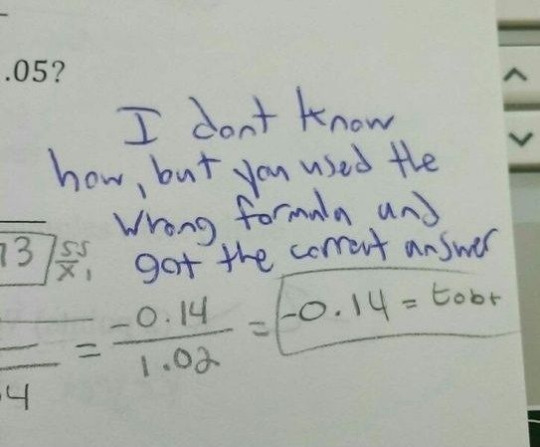
For instance, if I were to argue that oil pipelines are bad because they disrupt the underground community of unicorns that forms the basis of my new-age religion - and that was my earnest argument, it wasn't a troll attempt to weaponize a religious freedom law - that's a bad argument, but it doesn't suddenly make oil pipelines GOOD. If I were to argue that you should support a certain marginalized group because it's trendy and makes you look good, dick move on my part, but that doesn't mean you should run out and join a hate group.
You with me so far? Cool.
So let's talk about the Bad Wizard Series.
Fact is, there ARE people who are approaching "drop the Bad Wizard Series" from a place of bad faith. A fallacious place. A place that involves smugness about knowing more about the evils in the world than you did at age 8, and overstatement of harm as if you PERSONALLY are paying the entirety of the asshole's checks. A place that is less about the actual, direct, tangible harm she is doing to marginalized communities - not just "harm" bastardized into a synonym for "making me feel a little sad and uncomfortable" but actually lobbying for new laws to make life materially harder for marginalized people in the UK, setting legal precedents and sending her talking points to politicians all over the world because she is so visible - than it is about the Bad Things in the books so You Should Have Known Better Even As A Kid And If You Didn't I'm Better Than You. Yes, there absolutely ARE people who are only making these claims for the feeling of superiority that comes from having a justified reason to hate something popular. I'd hazard a guess that they're probably more of a loud minority than anything, but to say that these arguments don't exist is naive at best.
But recall the fallacy fallacy: just because some people are being assholes with shitty reasoning about why, doesn't mean that continuing to give the BWS financial or cultural support ISN'T something that is being used to do active, tangible harm to marginalized communities - mostly but not exclusively trans people; note how ever since she went full-force asshole she's been sidling up with LOTS more far-right hate groups and BASING her latest works on ableist and antisemitic hatred rather than just having the stereotypes as a frustratingly common element through Standard Fantasy Tropes.
Furthermore, while the bad faith arguments do often rely on an implied overstatement of how much she personally earns from your individual purchases and continued engagement, saying "that's bullshit, I'm just a drop in the bucket" is arguably ALSO a case of the fallacy fallacy, because we are at a tipping point, poised to turn what was once a cultural mainstay synonymous with preteen-young teen fantasy into a LIABILITY. New films and spinoffs and merch lines are roughly as likely to flop as they are to succeed; if just a handful more people gave enough of a shit to find or create other magical worlds to redirect their passion to...
...what I'm saying is that you, personally, may not have ever given her more than a few cents, but you DO have the potential, a small but significant chance, to be the final nail in the coffin. Even if she, personally stays afloat thanks to the people who like her newer propaganda BECAUSE she's a bigot, demonstrating that her bigotry is hated enough to well and truly kill a cultural giant IS a massive blow to the ideology that did it.
In short: Just because some people are indeed smug assholes who only care about being justified in hating what's popular doesn't mean that it's suddenly not true that there's unique harm done by the BWS and it's really best for you and everyone around you to just - appreciate the friends you made in the fandom, try to continue to enjoy the good memories, and get the hell out.
5 notes
·
View notes
Text
Week Two
Classism Through Minimalism
Minimalism is described as an intentional lack of decoration or adornment in style or design, although it is most frequently connected with aesthetics, it is also considered to be a way of life. It is based on the principle that less is more and that by freeing your home, you can also free your mind and spirit. However, this approach also involves replacing items that don't complement the aesthetic with more simple alternatives. This "less is more" philosophy is deceptive because it requires a lot of time, money, and effort to change your home to suit a style. It’s all very well getting rid of all your possessions if you can afford to buy them again any time you want. Minimalism is a privilege of the wealthy because being wealthy gives you freedom of choice.
Artist Models
This week my choice for artist models were based off of the connection to my theme, rather than aesthetic properties.
Sophie Calle
Through searching for research material I found a book titled ‘Appointment with Sigmund Freud, by Sophie Calle, a French writer, photographer, installation artist, and conceptual artist. The book depicts Calle’s 1998 exhibition taking place in Freud’s former home, where she assembled personal objects and related texts, which were juxtaposed with objects from Freud’s personal collection. Calle reveals intimate secrets and gives context to her installation from almost a decade earlier, giving the audience an intimate glimpse into the significance of these seemingly plain artefacts.
What I appreciate about this body of work is how Calle uses a similar environment to compare and contrast Freud's and her possessions to make comparisons between their lives. It demonstrates how our shared experiences and feelings bind us all together. Calle also gives the viewer a sense of validation by revealing not only her memories but also the powerful emotions that went along with them.


Fiona Pardington
Fiona Pardington is an Auckland-born photographer whose images are characterised by their dark atmosphere and depictions of plants and animals. She encourages conversation, questions mortality, and celebrates preservation through her still life photographs. Pardington is an artist that I am drawn to year after year. Unlike the other artist models I have chosen to look at, Pardington narrates her stories ominously, with her use of dark scenes and morbid relics.


Tracey Emin
British artist Tracey Emin is well-known for her autobiographical and candid works. Emin creates artwork in a range of media, including sewing appliqué, neon text, cinema, photography, painting, and sculpture. Emin's installation from 1998, named "My Bed," provided a window into the then-35-year-life old's following a devastating relationship breakup. Used condoms, cigarette butts, and empty vodka bottles were incorporated in the piece, which was a replica of the artist's bed at the time.
Many strong emotions were evoked in viewers by this installation; some loved it and some loathed it. This could be due to the fact that it recreates a very relatable experience that almost everyone has gone through at some point in their lives.


Test Images



References
Calle, S. (2005). Appointment with Sigmund Freud. Thames and Hudson.
Cavalhieri, K. E., Chwalisz, K. (2020). Development and Initial Validation of the Perceived Classism Experiences Scale. The Counseling Psychologist, 48(3). https://doi.org/10.1177/0011000019899395
Griffin, D. (2008). How Photography Connects us [TedEd Video]. TedEd. https://ed.ted.com/lessons/how-photography-connects-us-david-griffin
Hurell, J. (2019). Fiona Pardington. Ocula. https://ocula.com/artists/fiona-pardington/
Rea, N. (2017). ‘Turner Was a Really Raunchy Man’: Tracey Emin on Why Her Infamous ‘My Bed’ Is Really Like a J.M.W. Turner Painting. ArtNet. https://news.artnet.com/art-world/tracey-emin-bed-margate-1115603
Stanton, A. (2022). Why Minimalism is a Privilege Reserved for the Wealthy. Matter. https://www.matterprints.com/journal/guide/why-minimalism-is-a-privilege-reserved-for-the-wealthy/
Tantawy, F. The Privilege of Minimalism. Radical Contemporary. https://radicalcontemporary.com/the-privilege-of-minimalism
Images
Sophie Calle. (1998). The Cup [Table setting with a cup]. Thames and Hudson.
Sophie Calle. (1998). The Wedding Photograph with Greg next to Freud’s Wedding Photograph [Table setting with wedding photographs]. Thames and Hudson.
Fiona Pardington. (2014). Ophelia, Captain Cook Teacup and Yarrow Floret [Still life with cat]. ArtNet. https://www.artnet.com/artists/fiona-pardington/ophelia-captain-cook-teacup-and-yarrow-floret-2xJuiclxPe6dLd6FrvwBcQ2
Fiona Pardington. (2021). The Fool [Still life composition]. Ocula. https://ocula.com/art-galleries/starkwhite/artworks/fiona-pardington/the-fool/
Stephen White. (2018). Tracey Emin at her exhibition "Tracey Emin ‘My Bed’” [Tracey Emin at her ‘My Bed’ exhibition]. ArtNet. https://news.artnet.com/art-world/tracey-emin-bed-margate-1115603
Naomi Rea. (2017). Detail of Tracey Emin, My Bed [Close up look at exhibition]. ArtNet. https://news.artnet.com/art-world/tracey-emin-bed-margate-1115603
0 notes
Text
ML Analysis: Love Rival: Why Kagami works but is still hated and why Luka doesn’t but is loved
Now this will be my most controversial Hot take, a lot of you already saw the title and are already organizing your complaints. I don't care, you are free to do so.
In a previous post, I discussed what makes a good love rival and if you want a good explanation of that, click the in bold link.
This is a VERY LONG POST, so I am posting a read more. I would love to hear your thoughts on this analysis. Do you agree? Do you disagree? Did you want to include something? Let me know.
I think in order to organize this post I will be splitting it up as follows.
Why Kagami Works as a Love Rival
Why She is Hated for it
Why Luka Doesn't Work as a Love Rival
Why He is Loved despite it
Final thoughts
So lets get to it
_______________________________________________________________________
Why Kagami Works as a Love Rival
Kagami Tsurugi was introduced in the episode Riposte, where she is established as a straightforward, no nonsense fencer that wants to be the best.
Her introduction is solid, she establishes her base and what the audience is supposed to know about her from the getgo. We also get the impression that Kagami when introduced would be a rival to Adrien, as they are competing in Fencing, which makes for a nice twist when they end up getting along and Kagami begins the task of being a Love rival. She starts off as a foil for Adrien, but then the reveal is she is actually a character foil for Marinette.
What also helps Kagami is that the show is mainly from Marinette’s perspective, so we get to see Kagami as Marinette does, as someone that is competing for Adrien’s affections, cementing the Rival aspect of the Love rival. Kagami clashes with Marinette causing Marinette to in turn be more upfront with her feelings and push harder to try and win over Adrien. This is something a good rival does, pushing Marinette forward and making her have to try. This rival aspect of Kagami’s character give Marinette urgency, which is something that is needed in order to drive Marinette towards a conclusion, whether it is to pursue Adrien or move on.
Now as a love interest, Kagami establishes her relationship with Adrien in a different way then Marinette. Kagami’s straightforward nature allowed her to tell Adrien how she felt much earlier on, she pushes and asserts herself. This contrasts Marionette’s approach to wooing Adrien, and also has an interesting parallel to how Chat Noir handles his feelings towards Ladybug. Acting as a mirror towards that relationship. While Kagami is not flirtatious like chat noir, she is upfront about her feelings. She puts it out there and is understanding when Adrien isn't ready to respond, much like how chat noir is with ladybug. But the difference being that ladybug and Chat noir’s dynamic has a bit more complexity to it. Regardless, Kagami checks the boxes needed to be a true love rival.
Now the last and most crucial part about Kagami is the character at the core. Cause in the end, we know her and Adrien’s relationship wont be endgame, and interestingly she will be better off afterwards. Ikari Gozen does an excellent job filling in more information about Kagami’s character. In this we get to see that Kagami’s life doesn't revolve around being Adrien’s love interest, she is someone that has her own struggles and wants to find freedom in her own way, be friends with people, but she is awkward. Her development from this and Loveater shows how much she has grown on her own, how she has come to see Marinette as a friend, how she understands that there is more to life than just fencing. She wants to prove she is good enough, and wants to show she is worthy of friendship and love. Those are themes and traits that can be cultivated and grown. Kagami’s greatest appeal is that she can grow beyond her role as a Love rival, and that is why she succeeds.
____________________________________________________________________
Why She is Hated for it
Now despite all of these great qualities Kagami has demonstrated as well as how perfect her character is for such a role, the fandom is mixed about her, some even down right hating her. Interestingly enough, the reasons they dislike Kagami is not because of her character. Especially when you consider the rise in popularity of Marigami. Its because of 3 other factors outside of Kagami’s control. Over-saturation, Writing, and Fandom trends.
Over-saturation seems like an odd choice but it perfectly describes the situation. In season 1, we are introduced to two other female characters that were reoccurring characters AND were romantically interested in Adrien. Chloé bourgeois and Lila Rossi. Now both of them can be considered antagonists, and that is kind of the problem. Two reoccurring female characters already have a thing for Adrien, and both of them are jerks (that being the lightest term I can use). Now we know Adrien would never end up with a bad girl, but that impression starts to stick and make it seem like a pattern. That Adrien only attracts bad people (excluding Marinette). By season 2, when Kagami was introduced, it just seemed to the fans like, “Oh great, ANOTHER one”. Despite Kagami being a good character, and someone that actually cares about Adrien outside of the shallow aspects that Lila and Chloé were invested in, fans were ready to write her off and, with how the show was written, you couldn't really blame them at the time.
The second is a bit more obvious, the shows writing. The largest offender being Frozer and Oni-chan. While Oni-chan was salted on by fans a bit excessively, I have no real defense for Frozer, Frozer was an awful episode and everyone involved should feel bad. Kagami suffers like many ML characters do from poor writing, now this doesn't destroy her character like many would like you to believe, but she gets portrayed in a more negative light when the intentions are not meant for it. Its a bit harder to explain, but just know poor writing and assume Zag interference was what caused issues.
The Last one is something that is a bit more controversial, Fandom trends. Now in season 2, fans really, REALLY, did not like Kagami. The first two reasons having a large impact on that, but what really made it hard for Kagami, was the fandom itself. Since she was introduced first, certain lovesquare shippers LOATHED her appearance, HOW DARE she jump in and disrupt the love square! There are more words that were used, most of which are very degrading towards women and I would not want to repeat. Kagami took the brunt of the fandom backlash, the one that ‘Ruined the Lovesquare’. And when season 3, or as I call it, the season of Salt, fans really hit her hard with hatred, the Adrigami fandom took a lot of salt from toxic stans, some of which didn't like adrigami because they hated Adrien and didn't want him to be happy. It is gross to think about and its tragic that she is hit hard by hatred simply for things outside of her control.
_______________________________________________________________________
Why Luka Doesn't Work as a Love Rival
Luka is the alternate love interest of Marinette and was introduced in Captain Hardrock. He is Juleka’s older brother and is a guitarist.
His introduction is not terrible, but it is not as strong compared to other characters, but I do believe it sets the mood for what he is as a character. His character is the friend’s nice older brother musician, thats kind of it. It sounds like I am being mean but that sums up his character. He isn't really a foil to Adrien or Marinette in anyway, there is no shocking twists or clever parallels to be made, its just Luka. Simply put, Luka doesn't work as a Love rival.
Luka isn't a rival character. He isn't competing with Adrien, he doesn't clash with Adrien in anyway that would help him develop. Adrien and Luka get along fine, there is not a single bit of tension or conflict between them. This isn't a good thing when they are suppose to be competing for the same girl. I already hear what you are thinking, ‘But Adrien likes Ladybug.’ you're right, why isn't Luka interested in Ladybug then? Why is there no clash with chat noir? The point of a Love rival is to push another character towards something, to be a measuring stick. Luka doesn't do that for Adrien, and that is why the rival aspect fails for Luka.
The next course would be the love interest part. Surely Luka is someone that works well as an alternate love interest for Marinette? You are somewhat right, he does work better as a love interest for Marinette rather than a rival for Adrien. But that doesn't make him a good love interest for her. In my take on Love rivals, there needs to be three criteria met to be an effective love rival/love interest, an unequal development of both character, a differing connection that the two share, and a character underneath that can exist outside of the relationship. Luka fails to meet 2 of these criteria. The unequal development of both of them, Marinette has shown some development from her interactions with Luka but the reverse is not provable, we have yet to see Luka really change because of his relationship with Marinette, we don't know how much Marinette has helped/hindered Luka with his struggles, the best argument I could think of was that Marinette helped him be more bold in silencer, but really that sort of falls flat because he has shown bold actions outside of that. Captain hard rock said that he wasn't really good at expressing himself with words, but he shows pretty capable of doing so with people outside of Marinette, like his sister, or expressing anger to Bob Roth, so I don't really see how that works. The other criteria he fails to meet is having a character should the relationship end, Luka’s relevance is tied to him being the other guy for Marinette to choose, we as a viewer have no concrete reason as of yet to see him grow or change after the split. It doesn't help that Luka has even encouraged Marinette to go after Adrien on multiple occasions. People say thats because he is truly selfless and ‘Because he cares’ but really it just shows how little interest he has in trying to win her over, it almost comes off as insulting to Marinette. The only thing that Luka managed to pass was by having a different dynamic with Marinette than Adrien had with her. But that dynamic is shoulder to cry on. I guess that explains why salt fics really try to make Luka into Adrien.
Luka’s character in itself isn't awful, he isn't a bad person or anything of the sort. He is inoffensive and thats the problem. A love rival is suppose to be a point of tension, one that pushes, one that causes development, a force that at its core is meant to help the characters grow, and Luka just isn't the character to do that. He isn't a love rival, or a love interest. Luka is a wall, a wall put in between the two main leads in order to cause a divide without causing tension.
_______________________________________________________________________
Why He is Loved despite it
Luka isn't a love rival, and yet despite it he is one of the more popular characters in the fandom. It was something so mind boggling to me, what did this character have that made him so well liked in the fandom? Why wasn't he as hated as Kagami was during her introduction? I found myself coming up with three reasons why this was the case. Luka was so loved because of Necessity, writing and Salt.
Much Like Kagami suffered from Over-saturation, Luka had the Opposite problem. Marinette’s other love interests all ended up losing interest by the end of the episodes they were in. Nino, Nathaniel, Theo (though it was for ladybug). All of them just got paired off with someone else shortly after. Marinette didn't have another person outside of Adrien that was potentially going for her attention. This necessity allowed for Luka to slip in and fill the gap. The fandom saw him show up and were excited! With Kagami *ruining* the lovesquare, they needed someone for Marinette to help mend her should kagami ‘Win’, and Luka won by default. So Luka was the one the screeching fandom saw as there answer.
The next key that helped Luka was the writing of the show. The problem with the writing in the show is that often the writing will clash and hurt the strong characters of the show. Luka, as someone that does not have any strong defining features is flexible and easy to write for the writers. It makes it easy for him to be written in a way that wont infuriate people because of bad writing. He is able to coast by without having his character be in jeopardy. In a way, he has nothing to lose.
The last factor is of course salt. Now in fandoms, salt is used as a means of criticism or used to describe problems with characters. Luka is someone that people don't really have a problem with, which during the season of salt, made him perfect for all those fics where they needed someone to be on Marinette’s side because Adrien was ‘the devil’ or Lila was an extra mean jerk. Luka didn't have any problems that were agitated by salt, so he was the perfect replacement for Adrien when the writer wanted to hate on the blonde. Luka was the substitute, he was the easy fix that took little effort to include. He was a nice older brother that already liked Marinette, perfect fix for any situation. Its rare to see Luka written in a negative light without his character being warped so far that he is a completely different character.
Luka is loved not because of the things he is, but simply because of the things he is not. He is used more as a means to an end rather than as a character. In the writing, he is more of a wall, while in the fandom he is more of a stand-in. At the end of the day, I don't know what is more tragic.
_______________________________________________________________________
Final Thoughts
Kagami and Luka are characters that were introduced in order to spice things up and add development for the main characters. I find that in some ways they do achieve that goal, but in other ways they fail. One of them embodies the spirit of a Love rival while the other embodies the love obstacle. Regardless of this analysis, your thoughts on Kagami and Luka are your own and you can love and appreciate them as you see fit.
______________________________________________________________________
If you want to support my insanity. Buy me sushi please
#ml#ml analysis#miraculous ladybug#love rivals#love rival#Gale's analysis#Here is a f***ing thesis on them#Kagami Tsurugi#Luka couffaine#luka critique#luka salt#Im tagging it because I will get that one angry anon that complains I don't tag it#adrigami#lukanette#lovesquare#ml fandom salt#ml salt#salt talks#lovekagami
366 notes
·
View notes
Text
BDSM and kink DO belong in Pride celebrations. This is why.
I've read a column on The Independent trying to explain why BDSM and Kink don't belong in Pride celebrations. What I found interesting is not only the lack of knowledge from the author, but the way he can contradict himself in the same article. I'll try to explain why based on my personal experience as a Leatherman.
Before anything I'd like to perfectly make myself clear: in the US (country where I live) showing your genitals or anus in public is illegal.
In the column, the autor tries to explain that BDSM and Kink aren't of good taste or decent enough for the public. And that could potentially alienate possible allies we could need in the LGBTQ movement. A lot of this type of arguments against the same LGBTQ community have been heard thorough our contemporary history, and most of the times have been used to attack and suppress us.
But contrary to what most of the readers think is the main error in the column, which is the wrongful denial of the presence of the BDSM and Kink collective based on their clothing or what they're doing in public, I think the main error lies deeper within the column.
The author tries to make a separation between sexual orientation and sexual preference. He states that where sexual orientation is of a permanent state, a sexual preference is a choice that can change. The author couldn't be any more wrong with this argument: BDSM and Kink people have both perfectly attached one to the other.
In my personal case as a Leatherman who has met diverse type of Leathermen around the globe, most of them coincide with what I think: a gay Leatherman can only be attracted to other gay Leathermen. That is the main characteristic of a fetish tied to a sexual preference. I cannot have sexual intercourse with a woman dressed in leather, or with a man dressed in casual clothing. My sexual orientation and preference are intimately tied one to each other.
The author makes a reference to his lack of knowledge from the subject when he tries to dismiss Leathermen, and most likely all Kinksters (rubbermen, pups, Levi, balloons, diapers, etc) and practicioners of BDSM to a simple case of a "preference", or a choice. He considers that at a certain point in my life I was given the option of liking Leathermen, a thing that never happened. There was a time when I was growing up (probably around when I was 6 or 7 years old) when I discovered that I like men dressed in leather. Before knowing that I was gay, or what being gay is, I was already a kinkster and I already had a defined sexual preference. If the author of the column had a minimum knowledge of the topic, he would have known that most fetish people are born with their fetishes in their blood: we cannot choose whether to accept or dismiss our fetishes, we have to practice them in order to be in peace with ourselves, to be our own true selves. In all my life I've met several diverse Leathermen and fetish people that cannot have a sexual hookup or a meaningful relationship with a person who does not share their sexual preference, or their fetish. That has happened to me. I've tried several times without success to have sex with a person who does not share my fetish. Having a shared fetish or kink is a basic requirement for me to have a good time with a man.
From that wrong argument on, the whole column loses its value. Thanks to his wrongful reasoning, the author falls into the same rhetoric that conservatives from the 60's, 70's, 80's, 90's, 2000's, 2010's and 2020's have long used to attack us: the BDSM and Kink collective (or replacing those with the LGBTQ acronym), which is nothing more than a bunch of people that CHOSE to get dressed in leather that day (or a bunch of people that CHOSE to love a person from the same sex) is not of good taste to mingle in a Pride celebration, or with the rest of the society in general. Other proof of his ignorance of the Kink and BDSM world can be seen in the same column: when the author mentions that he's practiced a fetish but no longer does. That implies that for him the fetish is nothing more than a costume he uses to make sex "more fun" and when he's over, he hangs it back in the closet and forgets about it until he needs it again. Unlike the author, I wear leather because that is who I am: a Leatherman. I consider that I use a costume when I go to work using casual clothes in a job that doesn't allow to wear leather garments.
Now I'd like to ask the author the specific type of Pride he's been going where showing genitals or anuses is allowed. Never in my lifetime as Leatherman I've been to a pride where people shows those. Any gay person (at least in the US) independently of whether if they participate in a collective or not, knows that showing the genitals or anuses in public is illegal. No matter how proud of being a Leatherman I am, I'd never do it, nor I ever will. I know the places where I can do that. Now, if his comments regarding the so called "sexual intercourses" he witness, or imagines, when assisting to a Pride event stems from the way we dress or act there, then I have the next words for him: stop reflecting your insecurities on us. I dress the way I do and act the way I do because that is what I want, that is who I am. If you have a problem with it, then that problem is yours and yours only to solve. I don't have to change my persona, nor I ever will, to accommodate to your insecurities.
Instead of attacking me, or the BDSM / Kink collective, the author should try to know me/us. He would get shocked to know that despite my preferences, I am a human being just like him: I have a job just like him, I go back home just like him, I go to bed just like him, and if someone attacks me I bleed, just like him. Maybe if he devoted more time to know us, or the different facets of the LGBTQ movement, he would spend less time attacking us. The attack to one of us does not minimize it's impact: an attack to one of us is an attack to all of us.
I also have some words for The Independent: shame on you for trying to legitimize voices of people that have no idea or knowledge of a topic you agree to publish. Rather than demonstrating the lack of knowledge and ignorance from the author, you're showing the null capacity from your editorial board to choose quality writers for your publication.
Lastly, I'd like to tell to my beloved LGBTqia+ / BDSM / Kink community: this month celebrate the freedom of being however you really are. We have a long history of fighting against what society tells us how we should be. Now is not the time to give up, nor to take a small break. And the best way to celebrate is this: if you're a Femdom, be a proud Femdom in the bank. If you're a Leatherman, be a proud Leatherman in the bus. If you're Queer, be a proud Queer in an art gallery. Gather together with your kinky friends, or just your friends and mingle with the rest of the society in your best gear. Let's build bridges of communication between our BDSM / kink world and the people that don't know us. Because what's better than a day, a week, a month or even a year of celebrations, is a lifetime of Pride.
39 notes
·
View notes
Text
The industry reflected on television
This is a translation of the post x made by @larryisinlove and @faithinrainbows
On many multiple occasions through the media around us we have read or heard a lot of people talking about the reality that the music industry faces and a lot of their aspects that we may not notice at a first look. However, we can see that a variety of TV programs (many of them released for younger audiences) gave us some kind of hints or messages on many chapters they present to us. Chapters which show us the reality artists face in the world of music industry.
Let's start by talking about the Disney series, "Hannah Montana." In the episode (3x10) we can see the protagonist of the series, Miley, dressed as the teenage pop star Hannah Montana along with a famous boy named Austin Rain, who claims to be her partner to the photographers and the media.
At first we see them united showing themselves in front of the cameras, but the reality behind it is that the relationship was only created to promote their song together called "Us Isn’t Us Without You."

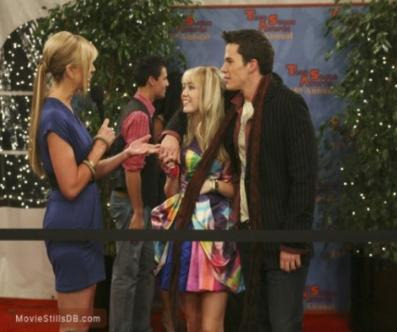
We are also going to mention the moment when one of the most famous series for children created by Nickelodeon, a very recognized television network, tried to make a reference ( more like a parody in my opinion) to a massive TV network we all have seen in the past which is Disney Channel. In one episode called “The Dingo Channel” they talk about a channel called “Dingo Channel” tried to copy the structure of the web channel protagonist the series iCarly and the way that channel was run in that period of time. We can see it as a satire the way some of the rumors Disney Channel and their creator were involved in. They qualified Disney basically like a network with little originality.
It is interesting to see how certain topics are presented as a joke, such as wars between television networks. Or how the protagonists go from making a channel on the internet to making it to television, but little by little they find big changes that the production wants to introduce, among them, change to the protagonists, and other modifications that culminates with a different program to the original.
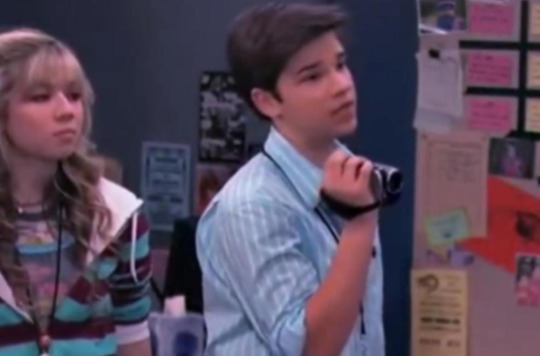

The third program to mention is another from Disney, "Gravity Falls" (1x17). They present to us a band called "Sev'ral Timez", and the protagonist is a fan of them. So, together with her friends, they decide to attend one of their concerts.
At the end of this, the girls are curious to know what is behind when the group disappears, so they go behind the scenes without anyone seeing them, to find various capsules. Inside them you could see the same boys, in different sizes, and the band in a large cage, as if they were animals. According to them, their manager keeps them safe that way.
You can see how the series wanted to demonstrate what happens many times in the industry, wanting to create perfect bands or artists, who manage to sell their image to their fans.
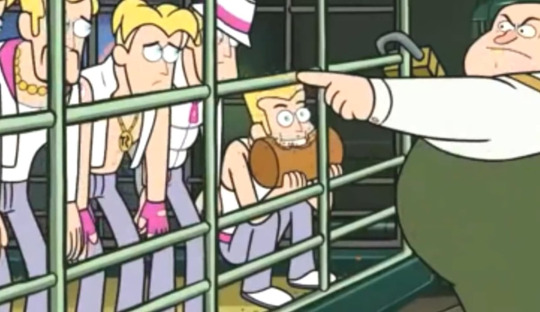
We go on to see what the fourth program presents, in Austin & Ally (Third season-episode 22). One of the Disney series that most thematically refers to the life of an artist in terms of their experiences or events they experience at such a young age is without a doubt Austin & Ally. Several things have been mentioned in relation to the life and growth that an artist has in this episode, exemplifying the main characters of this series. In addition to having their typical Disney touch that characterizes them, it also shows how the characters develop their personalities in the artistic environment and in the world of the music industry.
A clear example in this particular episode called "Relationships and red carpets" that draws a lot of attention at the moment of analyzing it, is to see how Austin and Ally prepare for an awards event, they have been nominated in the same category and would basically come to mean the big moment of the beginning of their careers as pop stars. They planned to announce their relationship to the public eye, but something happens that caught a lot my attention and that is something not far from reality is that Jimmy (owner of the record company in which Austin signed) prohibits him to make his relationship something public with the clarification that it would not be a good thing for his image and that what he wants to sell with Austin is something for teenagers who will eventually buy his music and have that fantasy of being able to go out and date that star, that star he wants to turn him into. He explains openly that this will make him sell more albums in the future. In this episode Austin and Ally try to make their relationship a secret with the purpose of showing Jimmy that they can deal with this. They even deny their relationship to the press at the award ceremony, but they realize that it is not easy at all. Austin risks his career at the cost of it by telling everyone he is dating Ally. This tells us that maintaining an image for sales is too important, it shows us that these things are not taken easily.
As a consequence Austin is unable to release music in any ways for the next 10 years due to the power that his label presents over his music by certain contracts that are mentioned in a basic way in the series.
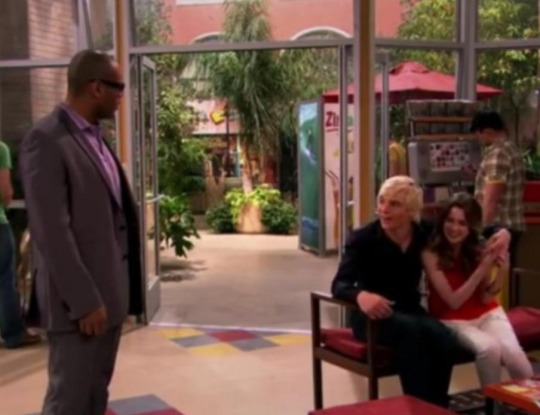
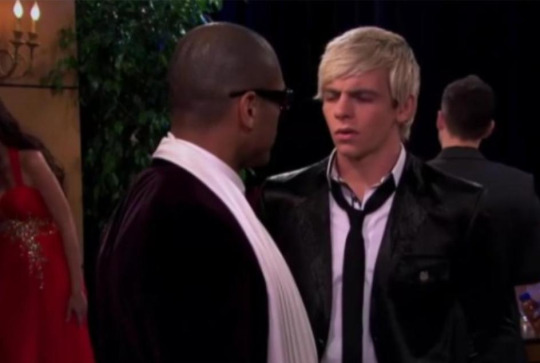
The next show belongs to Nickelodeon, "Victorious." In this series we find a rather peculiar chapter, within this we see in a developed way how they ask teenagers to send videos showing their skills in music, and with that they achieve a career. The person who did these auditions was a man named Mason, and particularly he is British, with great power in the industry.
The winner of the contest is Tori, the protagonist of the series, who is summoned to a confidential meeting in order to talk about her future. She happily goes with the idea that she should only sing and be her, to which they respond "Your image does not sell, so we are going to create a new one for you", something that we know happens a lot. And they put a condition on it. They tell her that she can't tell anyone about her control over her image, not even her friends. This is how they put wigs on her, flashy clothes, and invent an insolent personality in addition to rumors that generated controversy, among them, causing a stir in restaurants in front of many people.
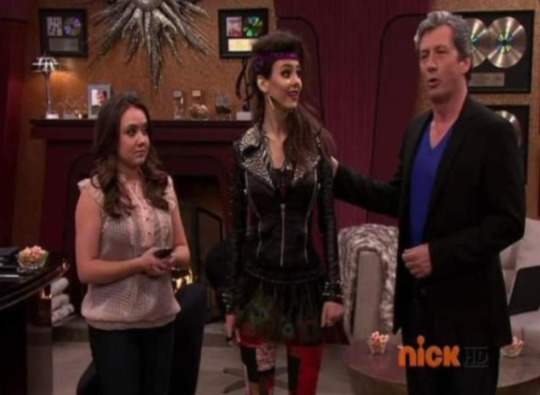
To finish, we are going to present what the movie Starstruck tells us, the life of a superstar and a girl he meets throughout the plot. In this film we see how this artist handles the moments in which he is told what to do to clean up the image he has a little and get more opportunities as an actor, he must keep himself out of the public eye, and obey everything they tell him to do or say and be cautious with whom he hangs out because of recent problematics he has had.
Basically this film, apart from touching the typical Disney theme of a love story, shows how this star tries to handle this fight in which he is constantly told what to say to the media or the people around him and also shows the way in which the media greatly influence the image of this artist. You can see the behavior of Christopher, the protagonist, at the time of making decisions in order to take care of his own image with the purpose of getting the role he wants to play, all this starts as it is usual from a recommendation that his manager gave him, therefore this idea does not come out of his mind and sporadically says or does things that make the girl he has a romantic interest in feel disappointed because she doesn't like the person that this star tries to be reaching a point of collapse due to all the hate and harassment by journalists which falls into it as a result of things the star said in order to clean its own image. Jesssica, played by the well-known Danielle Campbell, gets tired of having constant harassment by the press, which was waiting for her to say something about the relationship of this normal girl with the big star Christopher is. She decides to give a speech that allows us to understand the intentions that these media require, to sell an artist and sell articles or magazines at the cost of freedom, privacy and quality as a person. (This is highly ironic). The star reconsiders and thinks that the best thing to do is to start taking control of his image and his life and decides to leave his opportunities as an actor and tell his parents who in a way were in charge of taking care of his image that they are fired and he wants to be himself.


As we could see in the examples mentioned above, and in many more that were not named, there are series or films that contain episodes in which they will give us examples or clues, some more direct than others, about the management around the artists in the middle.
It is not unusual that there are so many examples, and so many similarities between them, or with what one already knows, hears, or reads.
The objective of this post is to imply that it is no secret what companies or managers do with their artists, the changes in appearance and personality, transform them completely, or even invent lives that they do not have. These chapters, or scenes that we name, are a step forward to show publicly what happens, and that the affected people cannot come out to say it.
26 notes
·
View notes
Text
Mazinger Z review time
im stealing @scope-dogg ‘s review format because who’s gonna stop me but also im not going to be as eloquent either so yeah
So it’s the grandpappy of super robot shows, fresh from the mid-70′s, which means it’s basically impossible for any mecha fan to go in without knowing a lot of plot points that were clearly intended to be huge at the time. For example, Koji spends several episodes lamenting the fact that Mazinger Z can’t fly; not-so-subtly hinting towards the development of the Jet Scrander, which is a signature part of Z’s design 50 years on in 2021. That said the show still had plenty of surprises for me, but at the same time was exactly what I had expected.
Every trope in the genre was solidified here; a hotheaded protagonist (with spiky hair!), Calling Your Attacks (even on multiple consecutive uses), and the good old monster of the week format. Said format is how almost the entirety of the 92-episode runtime is delivered; Dr. Hell and Baron Ashura send out a mechabeast, Koji goes out in Mazinger Z to beat it up. Most major plot advancements, early on at least, come from upgrades being made to Mazinger Z rather than any major change in the worldstate. That said, it’s always exciting when these changes happen, even if you know about them ahead of time. The aformentioned Jet Scrander was a major development; and presented not just as an upgrade to Z’s fighting power, but as a moment of character advancement for Koji: being able to experience the freedom of flight.
Around this formulaic (by modern standards) progression of robot fights is a cast of characters all of whom are engaging and fun in different ways. Koji is our hot-blooded protagonist, and also the character I liked least for a lot of the series as his arrogant nature is demonstrated by having him treat his friends like shit for the first half of the show, though he does grow out of that. Our main villain Dr. Hell is more of a set piece for a lot of the series, with his underlings having more developed character, and Baron Ashura in particular being a fantastic rival who is caught between obsessively wanting to overcome the obstacles of Koji and Mazinger Z, but also desperately wanting to earn the favor and recognition of Dr. Hell, even if it means suffering humiliation for it. Boss was a lot more dynamic than I was expecting, filling roles as everything from comic relief, to backup hero, to a rock of support for the other characters. Love this guy. Rounding out the hero trio is of course Sayaka, who notably has veterancy over Koji in terms of mech piloting experience, and is pretty much the only person who can keep Koji in check.
The series is long, at 92 episodes, and as stated before the monster of the week format means a lot of those episodes, especially in the early series, don’t really develop the overall plot. A lot of episodes re-use plot points as well (take a shot for every time you see Koji unconscious at the bottom of the ocean). However, it picks up pace once Count Brocken is introduced, and once Archduke Gorgon is introduced during the final 20-ish episodes the series goes into breakneck with almost no filler at that point. Still, none of the episodes feel like filler because every single character is so charming that simply seeing them interacting with each other is enjoyable; and the moments that do advance the plot, like the development of the Scrander or Boss Borot, or the “death” of Aphrodite A consistently kept me excited to see what was next. As I mentioned at the start, even with 50 years of foreknowledge there were surprises. Venus A (which doesnt appear in this series) is dramatically more popular, so I had never heard of Diana A before and was thrown off completely when it was built as Aphrodite A’s successor.
The show has it’s issues like the overlong run-time, the presence of some unpleasant racial caricatures like Viscount Pygman, and the rehashing of plot points in a few places; but ultimately it stands the test of time as the original Super Robot series. Highly recommend for anyone willing to devote the time, and the Great General of Darkness tv special serving as a substitute for the final episode is phenomenal. I give it a hearty MAZIN GO out of ten.
EDIT: completely forgot to mention the several songs by the Aniking himself Ichiro Mizuki
15 notes
·
View notes
Note
hi! so we have established at this point that you have A Lot Of thoughts about antony and brutus. but how does caesar (julius, not the little bitch octavian) play into that? bc like. my knowledge and impression of them is very limited and mainly constructed from watching hbo rome and idk. i think it'd be fun to throw caesar in the mix. love all the art and writing on your blog btw! have a nice day.
Hey, okay! So this used to be over 30 pages long (Machiavelli and Caligula got involved and that's when things got out of hand), but through the power of friendship and two late night writing dates fueled by coffee, I’ve cut it way down to under 10. Many thanks to the people who listened to me ramble about it at length, and also to a dear friend for helping me cut this down to under ten pages!
Also, thank you! I'm glad you enjoy the stuff I make! It makes me very happy to hear that!
And quickly, a Disclaimer: I’m not an academic, I’m not a classicist, I’m not a historian, and I spend a lot of time very stressed out that I’ve tricked people into thinking I’m someone who has any kind of merit in this area. It's probably best to treat this as an abstract character analysis!
On the other hand, I love talking about dead men, so, with enthusiasm, here we go!
For this, I’m going to cut Shakespeare and HBO Rome out of the framework and focus more on a historical spin.
Caesar is a combination of a manipulator and a catalyst. A Bad Omen. The remaining wound that’s poisoning Rome.
Cassius gets a lot of the blame for Brutus’ turn to assassination, but it overlooks that Brutus was already inclined towards political ambition, as were most men involved in the political landscape of the time.
Furthermore, although Sulla had actually raised the number of praetorships available from six to eight, there were still only two consulships available. There was always the chance that death or disgrace might remove some of the competition and hence ease the bottleneck. But, otherwise, it was at the top of the ladder that the competition was particularly fierce: whereas in previous years one in three praetors would have gone on to become consul, from the 80s BC onwards the chances were one in four. For the senators who had made it this far, it mattered that they should try to achieve their consulship in the earliest year allowed to them by law. To fail in this goal once was humiliating; to fail at the polls twice would be deemed a signal disgrace for a man like Brutus.
Kathryn Tempest, Brutus the Noble Conspirator
The way Caesar offered Brutus political power the way that he did, and Brutus accepting it, locked them into the assassination outcome.
Here is a man who’s built his entire image around honor and liberty and virtu, around being a staunch defender of morals and the republic
In these heated circumstances, Brutus composed a bitter tract On the Dictatorship of Pompey (De Dictatura Pompei), in which he staunchly opposed the idea of giving Pompey such a position of power. ‘It is better to rule no one than to be another man’s slave’, runs one of the only snippets of this composition to survive today: ‘for one can live honourably without power’, Brutus explained, ‘but to live as a slave is impossible’. In other words, Brutus believed it would be better for the Senate to have no imperial power at all than to have imperium and be subject to Pompey’s whim.
Kathryn Tempest, Brutus the Noble Conspirator
and you give him political advancement, but without the honor needed for this advancement to mean anything?
At the same time, however, Brutus had gained his position via extremely un-republican means: appointment by a dictator rather than election by the people. As the name of the famous career path, the cursus honorum, suggests, political office was perceived as an honour at Rome. But it was one which had to be bestowed by the populus Romanus in recognition of a man’s dignitas.69 In other words, a man’s ‘worth’ or ‘standing’ was only really demonstrated by his prior services to the state and his moral qualities, and that was what was needed to gain public recognition. Brutus had got it wrong. As Cicero not too subtly reminded him in the treatise he dedicated to Brutus: ‘Honour is the reward for virtue in the considered opinion of the citizenry.’ But the man who gains power (imperium) by some other circumstance, or even against the will of the people, he continues, ‘has laid his hands only on the title of honour, but it is not real honour’.70
Brutus may have secured political office, then, but he had not done so honourably; nor had he acted in a manner that would earn him a reputation for virtue or everlasting fame.
Kathryn Tempest, Brutus the Noble Conspirator
Brutus in the image that he fashioned for himself was not compatible with the way Caesar was setting him up to be a political successor, and there was really never going to be any other outcome than the one that happened.
The Brutus of Shakespeare and Plutarch’s greatest tragedy was that he was pushed into something he wouldn’t have done otherwise. The Brutus of history’s greatest tragedy was accepting Caesar’s forgiveness after the Caesar-Pompey conflict, and then selling out for political ambition, because Caesar's forgiveness is not benevolent.
Rather than have his enemies killed, he offered them mercy or clemency -- clementia in Latin. As Caesar wrote to his advisors, “Let this be our new method of conquering -- to fortify ourselves by mercy and generosity.” Caesar pardoned most of his enemies and forbore confiscating their property. He even promoted some of them to high public office.
This policy won him praise from no less a figure than Marcus Tullius Cicero, who described him in a letter to Aulus Caecina as “mild and merciful by nature.” But Caecina knew a thing or two about dictators, since he’d had to publish a flattering book about Caesar in order to win his pardon after having opposed him in the civil war. Caecina and other beneficiaries of Caesar’s unusual clemency took it in a far more ambivalent way. To begin with, most of them were, like Caesar, Roman nobles. Theirs was a culture of honor and status; asking a peer for a pardon was a serious humiliation. So Caesar’s “very power of granting favors weighed heavily on free people,” as Florus, a historian and panegyrist of Rome, wrote about two centuries after the dictator’s death. One prominent noble, in fact, ostentatiously refused Caesar’s clemency. Marcius Porcius Cato, also known as Cato the Younger, was a determined opponent of populist politics and Caesar’s most bitter foe. They had clashed years earlier over Caesar’s desire to show mercy to the Catiline conspirators; Cato argued vigorously for capital punishment and convinced the Senate to execute them. Now he preferred death to Caesar’s pardon. “I am unwilling to be under obligations to the tyrant for his illegal acts,” Cato said; he told his son, "I, who have been brought up in freedom, with the right of free speech, cannot in my old age change and learn slavery instead.
-Barry Strauss, Caesar and the Dangers of Forgiveness
something else that's a fun adjacent to the topic that's fun to think about:
The link between ‘sparing’ and ‘handing over’ is common in the ancient world.763 Paul also uses παραδίδωμι again, denoting ‘hand over, give up a person’ (Bauer et al. 2000:762).764 The verb παραδίδωμι especially occurs in connection with war (Eschner 2010b:197; Gaventa 2011:272).765 However, in Romans 8:32, Paul uses παραδίδωμι to focus on a court image (Eschner 2010b:201).766 Christina Eschner (2010b:197) convincingly argues that Paul’s use of παραδίδωμι refers to the ‘Hingabeformulierungen’ as the combination of the personal object of the handing over of a person in the violence of another person, especially the handing over of a person to an enemy.767 Moreover, Eschner (2009:676) convincingly argues that Isaiah 53 is not the pre-tradition for Romans 8:32.
Annette Potgieter, Contested Body: Metaphors of dominion in Romans 5-8
Along with the internal conflict of Pompey, the murderer of Brutus’ father, and Caesar, the figurehead for everything that goes against what Brutus stands for, Brutus accepting Caesar’s forgiveness isn’t an act of benevolence, regardless of Caesar’s intentions.
On wards, Caesar owns Brutus. Caesar benefits from having Brutus as his own, he inherits Brutus’ reputation, he inherits a better PR image in the eyes of the Roman people. On wards, nothing Brutus does is without the ugly stain of Caesar. His career is no longer his own, his life is no longer fully his own, his legacy is no longer entirely his. Brutus becomes a man divided.
And it’s not like it was an internal struggle, it was an entire spectacle. Hypocrisy is theatrical. Call yourself a man of honor and then you sell out? The people of Rome will remember that, and they’re going to make sure you know it.
After this certain men at the elections proposed for consuls the tribunes previously mentioned, and they not only privately approached Marcus Brutus and such other persons as were proud-spirited and attempted to persuade them, but also tried to incite them to action publicly. 12 1 Making the most of his having the same name as the great Brutus who overthrew the Tarquins, they scattered broadcast many pamphlets, declaring that he was not truly that man's descendant; for the older Brutus had put to death both his sons, the only ones he had, when they were mere lads, and left no offspring whatever. 2 Nevertheless, the majority pretended to accept such a relationship, in order that Brutus, as a kinsman of that famous man, might be induced to perform deeds as great. They kept continually calling upon him, shouting out "Brutus, Brutus!" and adding further "We need a Brutus." 3 Finally on the statue of the early Brutus they wrote "Would that thou wert living!" and upon the tribunal of the living Brutus (for he was praetor at the time and this is the name given to the seat on which the praetor sits in judgment) "Brutus, thou sleepest," and "Thou art not Brutus."
Cassius Dio
Brutus knew. Cassius knew. Caesar knew. You can’t escape your legacy when you’re the one who stamped it on coins.
Caesar turned Brutus into the dagger that would cut, and Brutus himself isn’t free from this injury. It’s a mutual betrayal, a mutual dooming.
By this time Caesar found himself being attacked from every side, and as he glanced around to see if he could force a way through his attackers, he saw Brutus closing in upon him with his dagger drawn. At this he let go of Casca’s hand which he had seized, muffled up his head in his robe, and yielded up his body to his murderers’ blows. Then the conspirators flung themselves upon him with such a frenzy of violence, as they hacked away with their daggers, that they even wounded one another. Brutus received a stab in the hand as he tried to play his part in the slaughter, and every one of them was drenched in blood.
Plutarch
For Antony, Caesar is a bad sign.
Brutus and Antony are fucked over by the generation they were born in, etc etc the cannibalization of Rome on itself, the Third Servile War was the match to the gasoline already on the streets of Rome, the last generation of Romans etc etc etc. They are counterparts to each other, displaced representatives of a time already gone by the time they were alive.
Rome spends its years in a state of civil war after civil war, political upheaval, and death. Neither Brutus or Antony will ever really know stability, as instability is hallmark of the times. Both of them are at something of a disadvantage, although Brutus has what Antony does not, and what Brutus has is what let’s him create his own career. Until Caesar, Brutus is owned by no one.
This is not the case for Antony.
You can track Antony’s life by who he’s attached to. Very rarely is he ever truly a man unto himself, there is always someone nearby.
In his youth, it is said, Antony gave promise of a brilliant future, but then he became a close friend of Curio and this association seems to have fallen like a blight upon his career. Curio was a man who had become wholly enslaved to the demands of pleasure, and in order to make Antony more pliable to his will, he plunged him into a life of drinking bouts, love-affairs, and reckless spending. The consequence was that Antony quickly ran up debts of an enormous size for so young a man, the sum involved being two hundred and fifty talents. Curio provided security for the whole of this amount, but his father heard of it and forbade Antony his house. Antony then attached himself for a short while to Clodius, the most notorious of all the demagogues of his time for his lawlessness and loose-living, and took part in the campaigns of violence which at that time were throwing political affairs at Rome into chaos.
Plutarch
(although, in contrast to Brutus, we rarely lose sight of Antony. As a person, we can see him with a kind of clarity, if one looks a little bit past the Augustan propaganda. He is, at all times, human.)
Antony being figuratively or literally attached to a person starts early, and continues politically. While Brutus has enough privilege to brute force his way into politics despite Cicero’s lamentation of a promising life being thrown off course, Antony will instead follow a different career path that echoes in his personal life and defines his relationships.
Whereas some young men often attached or indebted themselves to a patron or a military leader at the beginning of their political lives,
Kathryn Tempest, Brutus the Noble Conspirator
+
3. During his stay in Greece he was invited by Gabinius, a man of consular rank, to accompany the Roman force which was about to sail for Syria. Antony declined to join him in a private capacity, but when he was offered the command of the cavalry he agreed to serve in the campaign.
Plutarch
To take it a step further, it even defines how he’s perceived today looking back: it’s never just Antony, it’s always Antony and---
It can be read as someone being taken advantage of, in places, survival in others, especially in Antony's early life. Other times, it appears like Antony himself is the one who manipulates things to his favor, casting aside people and realigning himself back to an advantage.
or when he saw an opportunity for faster advancement, he was willing to place the blame on a convenient scapegoat or to disregard previous loyalties, however important they had been. His desertion of Fulvia's memory in 40, and, much later, of Lepidus, Sextus Pompey, and Octavia, produced significant political gains. This characteristic, which Caesar discovered to his cost in 47, gives the sharp edge to Antony's personality which Syme's portrait lacks, especially when he attributes Antony's actions to a 'sentiment of loyalty' or describes him as a 'frank and chivalrous soldier'. In this context, one wonders what became of Fadia.19
Kathryn E Welch , Antony, Fulvia, and the Ghost of Clodius in 47 B.C.
Caesar inherits Antony, and like Brutus, locks him in for a doomed ending.
The way Caesar writes about Antony smacks of someone viewing another person as something more akin to a dog, and it carries over until it’s bitter conclusion.
Caesar benefits from Antony immensely. The people love Antony, the military loves Antony. He’s charming, he’s self aware, he’s good at what he does. Above all of that, he has political ambitions of a similar passion as Brutus.
Antony drew some political benefit from his genial personality. Even Cicero, who from at least 49 did not like him,15 was prepared to regard some of his earlier misdemeanours as harmless.16 Bluff good humour, moderate intelligence, at least a passing interest in literature, and an ability to be the life and soul of a social gathering all contributed to make him a charming companion and to bind many important people to him. He had a lieutenant's ability to follow orders and a willingness to listen to advice, even (one might say especially) from intelligent women.17 These attributes made Antony able to handle some situations very well."1
There was a more important side to his personality, however, which contributed to his political survival. Antony was ruthless in his quest for pre-eminence
Kathryn E Welch , Antony, Fulvia, and the Ghost of Clodius in 477 B.C.
None of this matters, because after all Antony does for Caesar
Plutarch's comment that Curio brought Antony into Caesar's camp is surely mistaken.59 Anthony had been serving as Caesar's officer from perhaps as early as 53, after his return from Syria.60 He is described as legatus in late 52,61 and was later well known as Caesar's quaestor.62 It is more likely that the reverse of the statement is true, that Antony assisted in bringing Curio over to Caesar. If this were so, then he performed a signal service for Caesar, for gaining Curio meant attaching Fulvia, who provided direct access to the Clodian clientela in the city. Such valuable political connections served to increase Antony's standing with Caesar, and to set him apart from other officers in his army.63
Kathryn E Welch , Antony, Fulvia, and the Ghost of Clodius in 477 B.C.
Caesar still, for whatever reasons, fucks over Antony spectacularly with the will. Loyalty is repaid with dismissal, and it will bury the Republic for good.
It’s not enough for Caesar to screw him over just once, it becomes generational and ugly. Caesar lives on through Octavian: it becomes Octavian’s brand, his motif, propaganda wielded like a knife. Octavian, thanks to Caesar, will bring Antony to his bitter conclusion
And for my "bitter" conclusion, I’ll sign off by saying that there are actual scholars on Antony who are more well versed than I am who can go into depth about the Caesar-Octavian-Antony dynamic (and how it played out with Caligula) better than I can, and scholarship on Brutus consists mostly of looking at an outline of a man and trying to guess what the inside was like.
At the end of the day, Caesar was the instigator, active manipulator, and catalyst for the final act of the Republic.
I hope that this was at least entertaining to read!
#i cut out A Lot and its thanks to the patience of Friends that i got it down to the length that it is#like i cannot stress enough that i worked machiavelli into this and started dissecting the whole#brutus-cassius conflict with the framework that it was orchestrated by caesar#typically tho i tend to treat caesar as a symbolic device. a representation of something Very Wrong#this is a tag for asks
12 notes
·
View notes
Text
Star Trek Daemons
These choices are based on the newer movie series (AOS) featuring Chris Pine, Zachary Quinto and Carl Urban, etc. I have only seen bits and pieces of the many previous Star Trek series, but I will use what little tidbits I have picked up to help with this selection. My choices are a mix of analysis matching (I like to use the Daemon Forum as a starting point) as well as thematic/plot things. Hope you like them! Please let me know what you think, and your own headcanons!
James Kirk - Indian blue Peafowl. Thematically, I think a peacock/peahen would tell us a lot about Jim and reflect his story arc very well. Peacocks are thought of to be vain, cocky, proud birds who strut around showing off. This seems like exactly what everyone thinks about Jim at first glance, the sort of air he gives off. But peacocks are much more than that, people just don’t realize it. I think that parallel works well since everyone starts by underestimating Jim to seeing past his showy-ness and growing to respect and appreciate him as their captain. Furthermore, peacocks are intelligent, bold, fearsome and very socially oriented. They can fly despite what people think, and they’ve been known to always perch just out of reach of predators. They’re loud and communicative, and will fight and defend what is theirs. They actually have spurs on the back of their feet. Mostly, peacocks are very social - they spend time in flocks or at least pairs, and Jim is a very social person who would do anything for his people, his crew. So mostly thematic reasons, but I think a peahen perched on the back of the captain chair would just really fit him.
Spock - Eurasian Lynx. To me Spock has always been a cat person in my mind: he just exudes the same aloof energy with hints of softness, playfulness and even sassy-ness in the right circumstances. However because he’s half Vulcan and they have that raw animosity and energy they work so hard to tame, I figured it would be a wildcat versus a domesticated one. Lynx’s are ambush predators and have been known to sit in trees and wait to drop on unsuspecting prey. This matches Spocks patience in planning and executing strategy. Lynx’s are solitary creatures, but are very good mothers to young - and while Spock is more of a loner, he cares deeply and passionately for those in his circle. Lynx are also found in all sorts of environments, making them adaptable and quick on their feet. Plus they have been known to hunt deer, showing their bravery and fierce power. Spock is also very technical and sassy and sarcastic when the mood strikes him, which just fits very well with a cat attitude in general. Personally, I like the image of an aloof Lynx at Spock’s side that betrays no emotion until they crack and go for the throat. (Additionally, Lynx’s are known for their tufted ears and I think that would be hilarious alongside Mr. Pointy-Ears himself.)
Dr. Leonard “Bones” McCoy - Canadian Goose. This one seems a bit odd, but just stick with me a moment. Geese are loud, bold, brash, hardy birds who are hard working, determined, and known for their short-fuse but deep care for others. It’s perfect for Bones. A goose migrates thousands of kilometres each year, and live largely in Canada through very cold temperatures. This makes them very hardy, and hard-working birds. Furthermore, geese - Canadian Geese especially - are known for their temper. They’re given a wide berth because they have clear boundaries and will loudly let you know when you even approach said lines in the sand. But under the abrasive defensiveness and loud protestation of the world, geese make incredible parents. They’re protective, defensive, and very loving to their children, or their flock, or their mate. Those they care about, they are a stalwart defender and provider, and will often immediately adopt any stray goslings that are a similar age to their own babies. Bones is crotchety and loud and stubborn and has a tendency to yell about anything and everything, but he’s determined and smart and a doctor - he cares for people and will fiercely protect those he claims as his. It’s an unusual choice, but once I thought of it I just can’t get rid of the idea.
Nyota Uhura - Steller’s Jay. Since these birds are a species of corvid, they sit among some of the cleverest bird species. Nyota is especially smart and aware of her surroundings, demonstrated by her ability to readily understand Spock’s techno-babble. Furthermore, the smarter an animal, the more mental stimulation and challenge they need, or they’ll get bored easily. Nyota seems like the hardworking type to constantly have something on the go. Steller’s Jays are very adaptable, and a little bit manipulative when they need to get something, which pairs well with Nyota’s drive and tenacity. Furthermore, Steller’s Jay is noted as being an accomplished mimic of both bird calls and other noises. This is a fun thematic parallel to Nyota’s unparalleled auditory and linguistic ability.
Hikaru Sulu - Monarch Butterfly. A lot of people would think that butterfly’s are delicate and emotionally sensitive people, but that is not true of monarchs. They have incredible migrating habits that indicate they are hardy and hard-working. And while they may be sensitive to and aware of their surroundings, they are not as emotionally delicate as they appear. These migrating habits are also rather specific, showing a value of control over things that thematically I like for a main pilot/Command division person. Monarchs are group oriented, and Sulu has a deep care for his crew and his family, thriving among others. While they’re not an aggressive creature, Monarchs are willing to take risks if the reward is worth it and are known for their “wander-lust” tendency to explore and adventure and try new things.
Pavel Chekov - Atlantic Puffin. Aside from being adorable, a puffin matches well with what I know of Chekov. Puffin are a more social bird and will have a good time in a group of any size, or even working on their own. They are also active and energetic, matching with Chekov’s youthful energy and constant work drive. While somewhat cautious in unusual scenarios, they are very proactive planners and are the kind to look before they leap - but they will take the leap. Puffins are dutiful and sensitive, and while Chekov is not shown to be some thin-skinned wreck, he is still very young and has some youthful optimism and outlook that leaves him a little more surprised by the jaded side of the universe. Mostly, I think a puffin is just very well suited to the young but hardy and capable man.
Montgomery “Scotty” Scott - Cairn Terrier. Terriers are smart, clever, stubborn, loud little dogs. They’re more independent than some other dogs, but are still very social. Terriers are very vocal about their thoughts and opinions, and are not afraid of putting others in their place and taking charge. Scotty is as sturdy as they come and is very good at what he does, equally willing and able to take over and run the ship engines as well as dive in after Jim in weird antics and crazy adventures. I picked a Cairn over another terrier type because Cairns are very curious and adventurous and are the perfect middle of the road terrier: not too stubborn, not too sensitive, not too independent, and not too daring. Scotty is the perfect mix of stubborn, sensitive, caring, independent, bold, brash, and cautious all rolled into one loyal, loud, eager terrier package.
*P.S I realize I have selected largely birds for this group, and it wasn’t intentional, I just found myself gravitating towards them. However, I have always equated birds with their wings and flying and freedom. I find birds are always a little more out going and adventurous and travel-hungry by nature, so I think finding a majority of birds on a space ship destined to travel the distant universe isn’t all too unrealistic.
19 notes
·
View notes
Text
Just A Facade (2/2)
Author: @wordsfromthesol
Pairing: Jason Todd x Reader
Taglist: @zphilophobiaz @anousiemay @malfoys-demigod @pricetagofficial @somnibats
Summary: Dick is very confused that his brothers seem to all be getting along with you, and worse…wanting to help you. And wait…were you dating his brother?!
Warnings: Violence, cursing, violence...more violence
Word Count: 2.0k
You woke up in one of Jason’s t-shirts, in his old room, very confused. As you moved to get up the pain racing up your side jogged your memory. “Shit, Jason’s gunna be so pissed at me.”
“You could say that again!” You heard his voice coming from the bathroom.
You slowly made your way to the bathroom and leaned against the door frame. “It’s not like I meant to get shot Jay.”
“Yeah, well, you could have told my idiot brother when it happened.” He stepped towards you, placing his hands on your shoulders. “Or even ME when you got to the cave.”
“I thought I could handle it…why was your brother there in the first place?” The question came out a little more accusatory than you meant. Jason took a step back and threw his hands in the air.
“Because, apparently, you tried to kill him last week.”
“He’s still on that? Ugh, I pulled my punches as much as I could without being glaringly obvious. Next time he shouldn’t be in the way of the actual target.”
“Maybe you should just tell him.”
“Why? He doesn’t need my life story.”
“Y/N/N…”
“Oh you’re one to talk mister come back from the dead and don’t tell anyone.”
“You didn’t even know me before I died!”
“So! I know you didn’t tell your brothers!”
“I know you’re doing this to distract me, and it’s working, but you need to tell him. He won’t trust you, and it will end up getting someone hurt on this case. And if that someone is you –” Jason’s voice trailed off.
It was your turn to throw up your hands in exasperation. Unfortunately, you had forgotten about your recent injuries. “Agh!” You grimaced as your hand went to your side.
“See, that’s a sign that you’re being too stubborn.” Jason smirked before pressing a kiss to your lips and lifting you up. He carried you until you got to the cave, where he gently set you down, allowing you to still use him as a crutch.
**
“Y/N!” Tim exclaimed at the sight of you, “I’ve found something!” He waited for you and Jason to arrive at his side before he continued. “So, they made a mistake coming after you.”
“How do you know that was related? A lot of people want me dead…”
“Well, I didn’t at first. But then, looking through your pictures…the ones you didn’t originally give us,” Tim shot a judgmental stare your way.
“Oh you would’ve done the same thing.”
“WELL, one of them caught the van…long story short I was able to trace it back here,” Tim points at the screen, “once they left your apartment.”
“Alright, I’ll do some recon then. Come on blue bird.” You gestured to Dick.
“It’s Nightwing – wait you want me to come?”
“Well I know I’m not going to be let out of here alone, so I’d rather just hitch a ride than have one of you bozos follow me.”
“She’s not wrong.” Jason stated plainly as he tossed you a bottle of pills, “Take one before you leave, and please don’t rip my stitches.”
“I’ll try my hardest.”
**
The two of you sat in silence on the rooftop for nearly an hour. Finally, Dick couldn’t take the silence anymore.
“Alright, you gunna try and kill me again, or what?” He finally blurted out, still trying to figure out why you requested him as your back-up.
“What? I never tried to kill you, calm your feathers.”
“Last week!”
“I had to make it look real…I wasn’t alone.”
“Yeah, I noticed that…”
“I know you don’t agree with my life choices Nightwing, but I don’t have much of a choice in the matter.”
“It may not be easy, but you can get out.” Dick made the comment as if it was from personal experience.
“No.” Your voice turned somber, “I can’t. My parents decided to pay for their freedom with mine. If I leave…they’ll just take my sister. There is no out for me.” Your eyes focused on the building below, not daring to face him.
“Sister?” Dick was quickly realizing how little he actually knew about you.
“Heh, yeah. I doubt she even remembers she has one. I got her out, found her a family. She was only four…I haven’t seen her since.”
“Huh, that’s why you actually dropped the act for a minute when you presented this case. I thought you were hiding something.”
“I was. My past.”
“How old were you?”
“Six.”
Silence rang through the night, as the two of you watched the building. Taking photos and notes of all the ins and outs. Finally, the two of you decided it was time to leave. Just as you pulled into the cave, Dick asked one more question…or tried to.
“Are you and Jason…”
“I’m going to let you talk to your brother about that one.” You interrupted his thought before scurrying out the door.
**
“Well, what did you find?” Tim eagerly awaited for another piece of the puzzle to fall into place.
“Didn’t see any kids, but there were definitely too many guards for a store called ‘Windows, Doors, and More’. Even if it is in Gotham.”
“So we check it out in the tomorrow during the day. By we, I obviously don’t mean you Y/N/N.”
“Yeah yeah Jay, I gathered.” The sarcasm dripped off your response.
“While we’re on that subject…” Now Tim and Damian had turned their attention to you as well. “We think you need a suit. A secret identity. These people found you too easily.”
You chuckled at the mere thought, “Yeah okay. I don’t have any family, there’s no point.” You didn’t notice the sorrow fill Jason’s eyes at your apathetic words.
“Fine, if you won’t do it for me then how about your sister. Just because she doesn’t know about you doesn’t mean others don’t.” Jason’s frustration was apparent.
Before you could comprehend the words, your fist collided with Jason’s jaw. Immediately, you stepped back. Your hands shaking.
“Hit me all you –” Before Jason could finish your hands cupped his face.
“No no no” you whispered more to yourself than him. A tear fell from your eye as your mind finally caught up. “Jay, I’m so sorry.” You pressed a kiss to his lips, then another, and another before enveloping him in a hug. “You’re right. I need to protect her. Protect you.” A faint smile grazed his lips and he pulled you from his chest, keeping his hands resting on your shoulders. The silence seemed to go on forever, until Damian couldn’t take it anymore.
“Finally! Now come see the suit we had designed for you.” It was the first time you had ever heard Damian Wayne excited for something.
You gave Jason a smirk, “You already had it made?”
“For almost a year now.”
“So you guys are together, right?!” You heard Dick’s confused voice bellow in the background. No one answered him.
**
The next day came and went and a plan was made. Your role was made minimal, and by minimal you meant being forced to sit as the look out on the rooftop across the street. Though you understood, you still couldn’t sit back and watch everything go down. You waited until you heard clear fighting happening in the warehouse when you made your way to the roof. Timing the break-in with a gunshot, you crashed through a second story window and made your way to a locked back room.
The five of you had narrowed the location of the children down to this room. It was the only thing that made sense, and you were determined to get these kids out. The lock was easy to pick, however, you were not expecting someone on the other side. Someone who knew exactly who you were, despite your newfound disguise.
“Oh look who saved me the trouble. I think I owe you another bullet for the number your friend did on my face.”
“Ya’know, he’s right outside…why don’t you just go pay it back now.”
“Somehow I think hurting you will do just that. But don’t worry, he’ll get his turn to.” As you pulled the gun holstered at your side the man delivered a swift jab to your injured side. The gun fell to the floor and you charged at him, dropping to the ground just before making contact and sweeping his legs from under him. He collapsed to the floor and you jumped on top of him, putting as much force as you could against his neck with your arm. As you felt your grip loosening you threw back your head and crashed in into his. You felt him go limp under your weight.
“Where the fuck are the kids.” You mumbled to yourself. You begin searching for a hidden panel or room. As you heard gunshots barrel through the warehouse, you looked down and noticed a locked hatch. Making quick work of the lock, you pulled the hatch open and were met with eight terrified eyes staring up at you.
“It’s okay, you’re safe now.” You reached your hand down, offering it to one of the children. After what seemed like hours, a brave soul took it in theirs. Thankfully, the others quickly followed. You soon realized you couldn’t get them out the same way you came in.
“Shit, alright guys. I need you to cover your ears.” You placed your hands over your ears as a demonstration before you set a small charge at the far wall. “Once this goes off you run through the opening and wait in the alley behind the next building. I’ll be there as soon as I can. I promise.” As the children nodded you set off the detonation, grabbed your gun, and positioned yourself between them and the door. You knew the noise would draw attention.
A man soon rounded the corner, only half the kids were out. You shot directly through his knee cap. He wasn’t alone. Upon hearing the shot, the second assailant somersaulted directly into your feet. You stumbled backwards, forcing the last child out of the opening. Your momentary loss of focus allowed the man to push you into the wall. He held one hand around your neck and the other around your wrist. He continued to slam your wrist into the wall until you were forced to drop the gun. You quickly latched your legs around his waist and jabbed your free arm into his side. His stumbled backwards, loosening his grip as he stumbled to stay upright with the additional weight. You pulled your other wrist from his grasp and launched it at his jaw. You heard a crack as your fist made contact. The hand at your neck flew towards his own jaw. As he was off guard, you fell into him, forcing him to fall backwards onto the ground. Just as you stumbled to get up, Jason raced into the room.
“This was not the plan!”
You smirked, “But it worked. Kids are in the next alley. Be a good birdie and go get them Nightwing.” Dick rolled his eyes but complied. Without a word, Damian and Tim joined him. Jason’s eyes trailed towards your neck, which was already starting to change color. Before he could berate you, you continued, your voice heavy. “They were kids Jay. They deserved a life. They deserved a choice.”
Jason pulled you into his chest, “They did, but now we have no one to question. There’s no way these idiots were the masterminds.”
“I know. I’m sorry.”
“Hey, we’ll figure it out. Together.”
#Jason Todd#jason todd fanfic#jason todd x reader#jason todd imagine#red hood#red hood fanfic#red hood x reader#red hood imagine#dick grayson#dick grayson fanfic#dick grayson x reader#dick grayson imagine#nightwing#nightwing fanfic#nightwing x reader#nightwing imagine#Tim Drake#tim drake fanfic#tim drake imagine#tim drake x reader#Red Robin#red robin fanfic#red robin x reader#red robin imagine#red robin x you#Damian Wayne#damian wayne fanfic#damian wayne x reader#damian wayne imagine#robin
157 notes
·
View notes
Text
Twice: Death of a Good Man
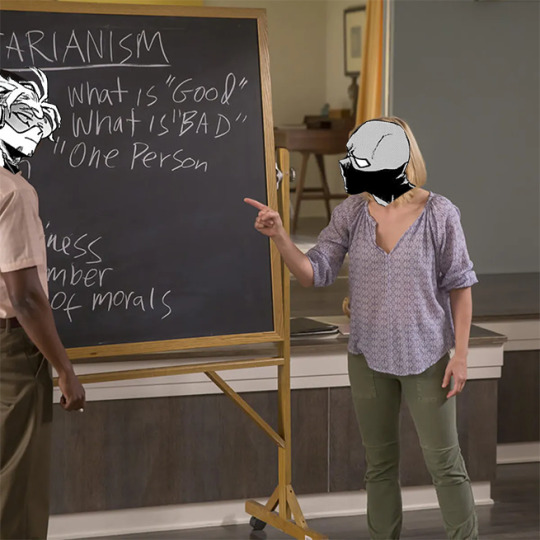
What is good?
What is bad?
What is the worth of one life?
That’s the question asked by the decision that Hawks makes to target twice. This post will look at the moral philosophies that overlap with those deicisions. @waxwingedhawks made a similiar post which you should check out, and while we might overlap I’ll be discussing different material. However the gist of this post is, even if Hawks decision was to prevent the deaths of thousands then is it worth it to kill a good man like Twice?
1. Should the Batman Kill Joker?
Slides taken from this powerpoint: [Source.]
There’s one famous example of ethics in hero comics that relates to this very issue of Hawks killing Twice. It’s especially relevant because Twice himself is a character based off the Joker, in that his whole life was changed by one bad day.
The ethical question is should batman kill the joker to put a permanent end to his crimes, and save the lives of everyone the Joker was going to kill in the future.
The quesetion itself demonstrates the conflict of Utiliarianism vs Deontology (or Kantian) when it comes to moral ethics. Utiliatiarnaism and Deontology are two opposing branches of ethics. And (this is simplifying here) the conflict between them arises from differing answers to this question? What is it that determines whether something is right or wrong.
Utiliarians believe that the results of an action are what determined if sometyhing is ethical or not. Therefore, this branch is called consequentialism because it states that the consequences of our actions define our actions. In other words the ends can be justified from the means.
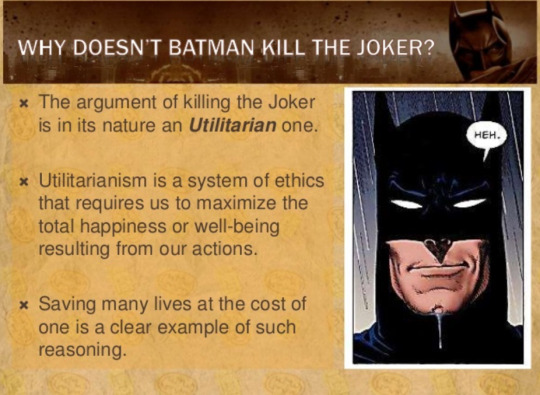
Deontologists believe that the means themselves are the ends. Batman’s no killing rule is a deontological one. Deontologist believe that morals are not determined by the results of our actions, but rather there are set rules outside of our actions that we choose to follow or ignore. A deontologist would say that nothing good can be achieved from unjust means.
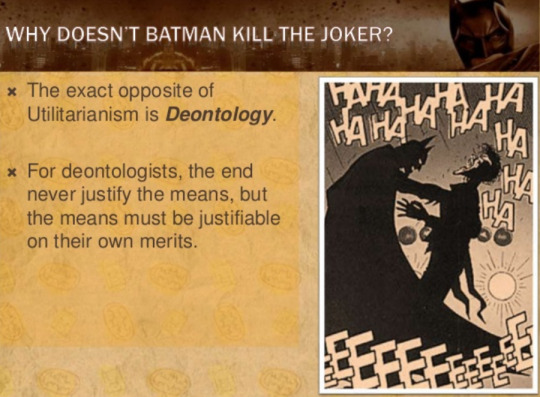
Batman believes killing is wrong, so he won’t kill the joker. The utilitarian argument is an appealing one. Batman could save so many lives if he just chose to bend his rule once. However, the appeal of utilitarianism is its flaw.
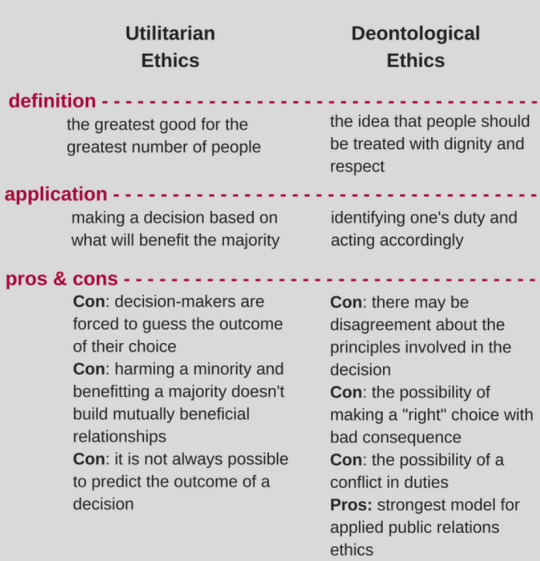
Utilitarianism summed up, is the greatest good for the greatest number of people. However, it pre-supposes that there is an objective greater good that the decision maker is working towards. Humans are fundamentally incapable of being objectives, and there’s no agreed upon objective “Greater Good”, its an idea that varies from person to person.
The problem with “the greater good” is that a lot can be seemingly justified towards it.
The reason batman doesn’t kill the joker, is the same reason crimminals are afforded civil liberties. It’s a deontological one. The idea that people always exist with certain rights, and should always be treated humanely is done for the sake of everybody. It’s not to let crimminals get away with crimes but rather to prevent innocent people from being wrongly persecuted.
For example you can use utilitarianism to justify putting cameras in people’s homes. If people never do anything wrong then there’s nothing to hide, right? Only the guilty will be punished. However, the reason we see this as a bad thing is because the definition of something wrong can change easily. If you put a camera in someone’s house, suddenly speaking badly about the government can be defined as something wrong, and you can be arrested for it.
As stated in the chart above, Utilitarianism is something that can quickly slide into harming a minority for the benefit of the majority.
To take another example from pop culture, there’s the famous scene in star trek 2 where Spock, a person who tries to live mainly by logical ideals rather than emotional one gives this famous quote.
Spock says, “Logic clearly dictates that the needs of the many outweigh the needs of the few.” Captain Kirk answers, “Or the one.”
However, while Star Trek is the source of this quote they also stated the exact opposite idea in the third movie, where every single characters comes together and puts themselves at risk to revive Spock. When Spock comes back to life, Kirk says the reverse.
“The needs of the one, outweigh the needs of the many.”
The third movie states while it may be true that one person’s life is worth sacrificing to help many people, the other is true as well. That many people can come together and risk their lives for the sake of saving one good man. The point being that the world doesn’t exist in strict utilitarian, or Detonological ideals, but rather we’re always working for a spectrum of both. People should make sacrifices for the greater good, and people should respect the individual needs of the minority are two ideas that only contradict each other in a world of black and white, in a world of heroes and villains.
2. Harming the Minority
So, once again returning to the ethical question set up by the Twice and Hawks conflict. Is saving perhaps thousands of people worth killing one good man?
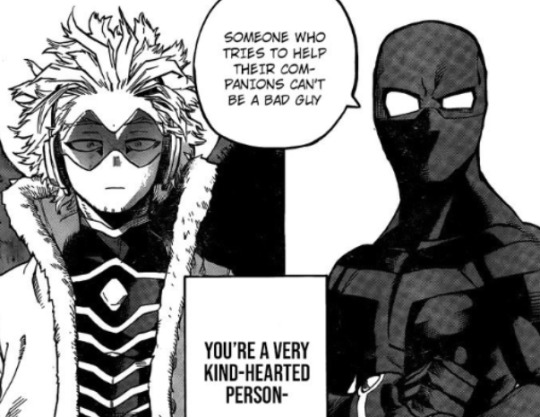
While Hawks is contemplating this question, the story gives us a very deontological rule. Someone who tries to help their companions can’t be a bad guy. Simply put, the act of helping other people is good, whether it comes from a hero, or a villain. In fact we’ve been shown this in the story before, Shigaraki is a murderer who lashes out at random, and he’s also a person who provided a home to several unstable people and helped them improve their lives, both of these ideas while contradictory exist at the same time.
Hawks and Twice’s beliefs contradict each other on a sociopolitical level. That is, both Hawks and Twice have a different idea on how society should be run. Hawks’ ideas are primarily collectivist, and Twice’s are individualist.

Hawks’ ideas are centered around two things, maximizing effiency, and the greater good. His goal has always been to save as many people as possible and to maximize the efficiency of his actions while doing so.

Hawks will always sacrifice the few for the sake of the many. What he believes, and what he was also specifically raised to believe is that he should be capable of saving everybody. That Hawks should devote all of himself to the sake of the people around him. The ideal of a hero, but not really a person. Hawks believes that whether people are saved or not lies entirely on him, and therefore he always maximizes the number of people he can save with every action.

Even sacrificing parts of himself with those decisions. When Hawks knows that he is not strong enough to kill the High End Noumu, intsead he sacrifices his wings (which are Hawks’ symbol of personal freedom) in order to give Endeavor the strength boost to defeat the villain. Hawks has to sacrifice himself. He always has to sacrifice himself for the many.

Which is why Hawks flies so fast. He genuinely believes (or rather was taught to believe) that if he works hard enough, if he sacrifices himself and is the perfect hero then he should be able to save the people he wants to save.

This is what makes Hawks the man who moves too fast. The reason other people can’t keep up with him is because they don’t devote absolutely all of themselves, to the point where they have no lives outside of their own work to the act of saving others.
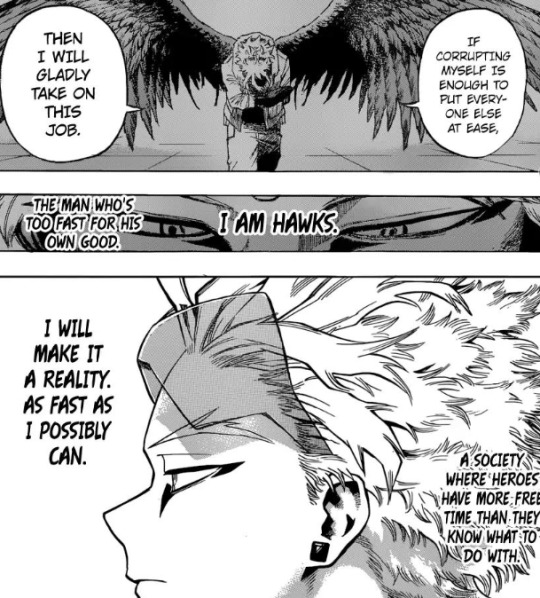
Hawks will always choose the selfless choice. Even the decision to kill is a selfless choice. You could argue that Batman not wanting to infringe upon his personal morals to kill Joker even though Joker might kill other people in the future is a selfish choice to make. Hawks would murder Joker in about ten seconds.
Hawks is a collectivst to the core. His argument is that personal feelings and invidual freedoms should be stomped all over if it’s something that benefits the whole of society.
The ideas of Twice and the liberation front as a whole are individualit ones. Basically, individual liberties should not be stepped all over for the process of the greater good.


The League of Villains and the Meta Liberation front are both a response to hero society’s tendency to let the minority suffer for the favor of the majority. I’ve spoken about this point before, but in the abstract the liberation front has broad, agreeable ideas.
Hero society is conformist in nature. People are often bullied because they do not fit the right kind of quirk.

In a society where literally everyone can shoot lasers out of their eyes, bullying people, intimidating them, pressuring them to conform is not necessarily the right answer. Collectivism works on the idea of there being an in-group and out-group. Obviously, for an in-group to even exist people have to be excluded.
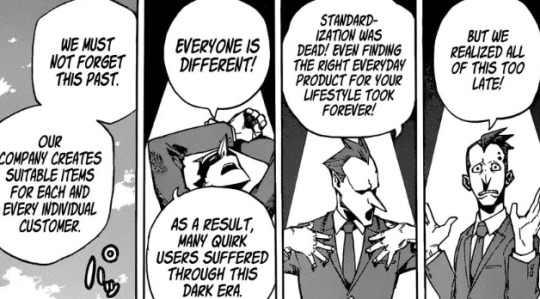
It would make more sense to run hero society from the angle of people have thousands of different types of quirks, we should do out best to maximize the inclusivity of society so that no one gets left out. The fact that people sympathize with the liberation army is because the current hero society, rather than trying to be accomodating to the differences between people and protecting the minority, instead chooses to oppress the minority and let people who could have been helped become villains because it’s just easier.
Which is what Twice’s backstory is entirely about. That even trying with your best intentions to turn your life around, you can fall out of society through no fault of your own.
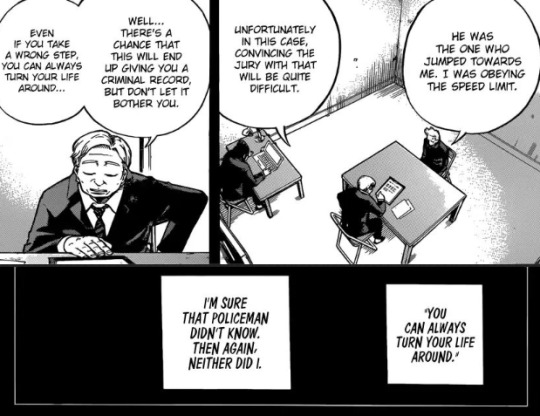
The idea that Twice became a villain not because he’s a good or bad person, but instead because of good or bad luck. Something that Twice really doesn’t have control over.
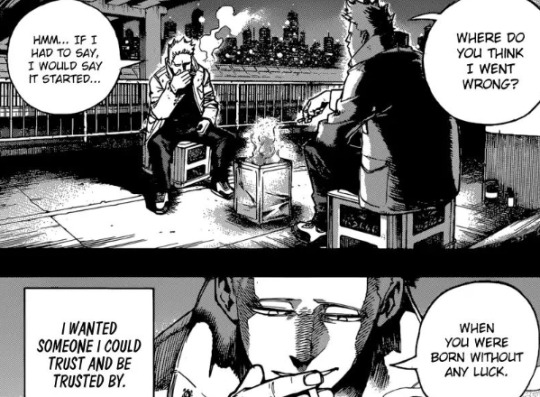
So, the LoV and MLA are an individualist response to an oppressively collectivist society as a whole. Those who cannot conform, want to destroy the current society that excludes them.
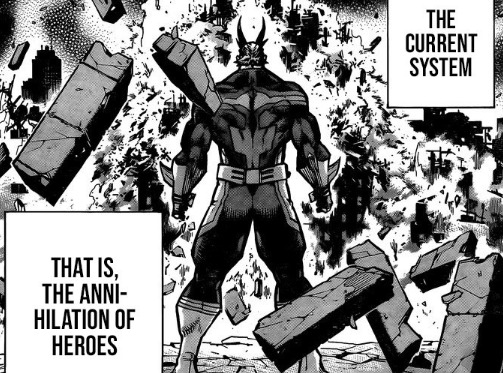
However, Twice values people’s feelings over the greater good of the mission, whereas Hawks will stomp all over his own feelings for the greater good of his mission the twist is that both of them are utiliatarians. Both Twice, and Hawks will justify murder in order to bring their ideal society in place. Twice’s philosophy sounds well and good that people who are outcasts should be taken care of, until you remember that Twice regularly wants to murder people in the name of protecting his small found family.
Twice still believes in a very unhealthy way that he needs to pay everybody back in the League of Villains for accepting him, by being useful to them. Even though the league cares about Twice’s feelings more than his use as a person, Twice still really sees himself the way that Hawks does. The only worth Twice has is a person is how useful he is to other. It’s just both of them justify their utilitarianism through different social viewpoints, Twice kills to protect the few, Hawks kills to protect the many.

3. The Death of a Good Man

Twice has stated these ideas before in the manga. First that he would never kill a friend, and second as what he told Hawks above a person who helps their friends can never be a bad guy. By Twice’s logic alone, Hawks betraying his friend makes him a bad person even if he is betraying that friend for good reasons.
For the final part of this meta I’m going to talk about the flaws of Utilitariansm. I’m going to use an example from another manga, Bungo Stray Dogs with the character Ango Sakaguchi.
In the second light novel we’re told the story of the Dark Era. To summarize, there are three people who work for the mafia, Dazai, Ango, and Oda. The three of them are drinking buddies, and sort-of-friends who meet outside of work and discuss. Eventually their work, or rather the system causes their friendship to fall into conflict.
Of these three people we have:
Oda, a handy man for the mafia taking care of orphans who has a person rule to never kill people directly, because he believes it’s an absolute wrong to kill someone.
Ango, a spy who incredibly similiar to Hawks will lie, manipulate, and deceive his own friends for the sake of what he always calls the greater good.
Dazai, a mafia executive who kills people and joined the mafia because he was suicidal and wanted to find a reason for himself to live.
Dazai and Ango exist on opposite sides of the political ideas spectrum, Dazai is an inidvidualist who only really thinks of himself, Ango thinks of the good of everybody as a collectivist at the cost of his individual relationships with his closest friend.
Oda is somewhere in the middle between them, however he’s acknowledged as a good person. The twist is Oda used to be an assassin that killed many people for whatever reason in the past. Just like Twice, he’s a dangerous crimminal. However, at the same time he was reforming himself, trying to be to a better person, and taking care of several orphans without a home. He had also stopped killing people at this point.
The story sacrifices one individual good man, in order to achieve what is called a “greater good” for everybody else.
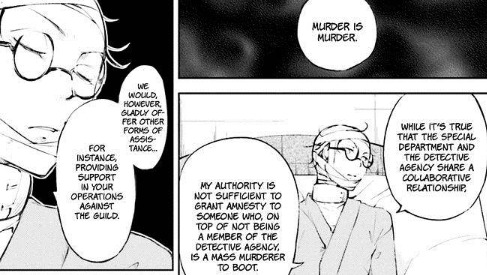
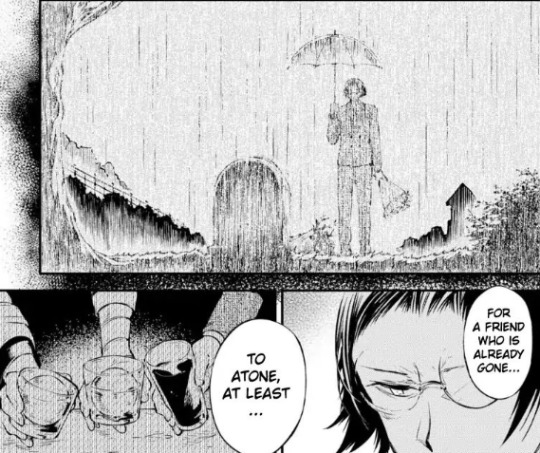
Ango is an individual with a strict and unbreakable moral code, always acting for the good of the majority. In a simple black and white story, he would be seen as a good person. However, not only did his actions result in the death of a good person, or at least a person trying to be good, all of the orphans Oda was trying to take care of died as well. That is a powerless minority was considered an acceptable sacrifice in order to maintain the status quo for a majority of people.
We see Ango make these choices again and again. To betray individual people for the sake of a faceless majority.

In the most recent chapter of the manga, he almost decided to shoot Atsushi in the head in order to make a quick decision to save as many people as possible. He even pretty much convinced himself that his only choice left was to murder Atsushi. Atsushi of course being… another powerless orphan with very little agency within society as a whole.
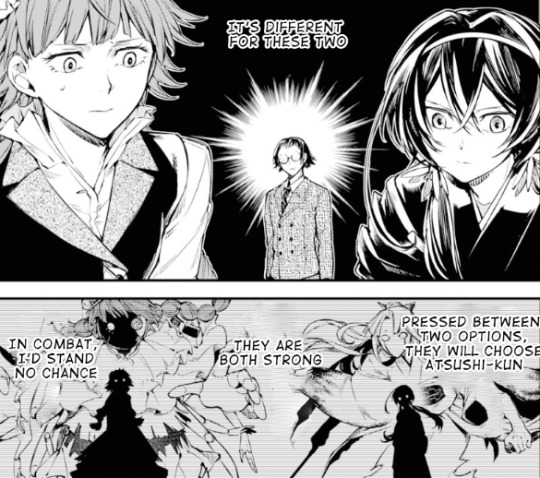
Ango would sacrifice Atsushi, someone who trusts him and is working with him if he thought it would help the greatst amount of people. Whereas, Lucy and Kyouka are people who would not kill Atsushi if they thought it would save people. They’d prioritize Atushi over the majority. Here we are coming into that conflict again.
However, as I’ve pointed out: the people who tend to be sacrificed are always in the minority. They would have been on the losing side regardless. Which is why true utilitarianism is impossible, because Ango is not making objective decisions here. He’s actually making very personal ones on the premise that he’s being objective. He keeps targetting over and over again peopele who are considered in the minority, and not only that Ango is very good at concinving himself he needs to do these things. Just as we witness Hawks convince himself that he needs personally to take out Twice.

Both of them are convinced that they are operating objectively, but instead are making very personal decisions. They have to be the one to pull the trigger themselves, Hawks corners Twice with a knife and Ango was ten seconds away from shooting Atsushi in the head the moment Atsushi stops being useful to him. Both of them repeat the worst flaws of their utilitarian mindset, by judging people based on their use to society as a whole rather than whether ot not they have the right to live and improve just for being people.
The counter to this logic is empathy. Twice is capable of murdering a lot of people, and has even done so in the past. However, at the same time that doesn’t make Twice a bad person, or a person capable of only doing bad things.
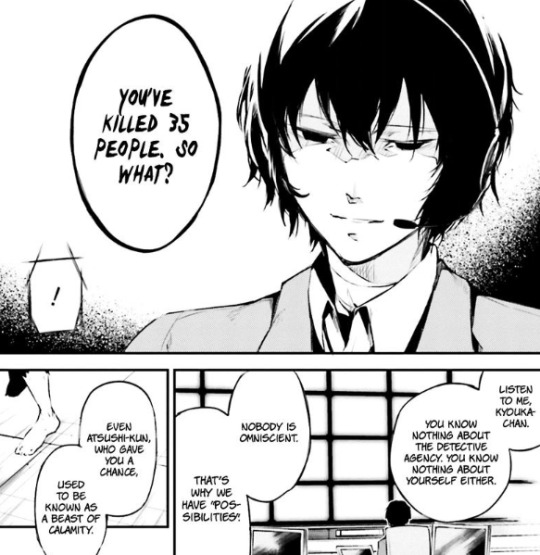
Opening your mind to the idea that people are both capable of good and evil depending on the circumstances, allows a person who has done bad things to be given the chance to do good things for the sake of others around them. Twice has done bad things in the name of the league, but it’s also Twice’s love and genuine compassion for others that has stabilized mentally a lot of the members of the league and allowed them to become better as people.

Someone capable of fighting to kill is also equally as capable of fighting to use that strength to protect. Basically, reality will always be at odds to ideals. Neither Hawks’ ideals nor Twice’s ideals allign with the reality that both of them exist in. Which is why there’s actually no need for them to fight each other.
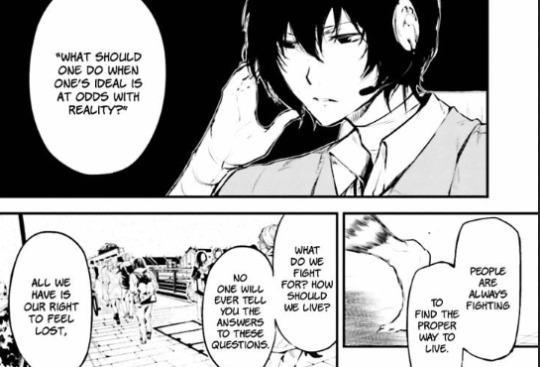

Empathy is the idea that everybody is struggling to live in their own way, that everybody is trying to live by their own means. Rather than forcing Hawks to Twice to fight, both of them could recognize that the other is struggling and needs help. Hawks needs someone to tell him that he deserves to be selfish, and take care of himself instead of continually sacrificing both himself and his emotions for the greater good. Twice needs someone to tell him that he doesn’t need to kill people, to be accepted by society. For both of them there are other options that exist, it’s just without empathy, without acknowledging the viewpoint of another person neither of them would ever be able to see those options.
What Hawks and Twice need isn’t for one of them to be right, and one of them to be wrong. They don’t need to fight and see who wins. What they need ultimately is each other to make up for what they are lacking individually. They are both victims with several things in common, while they’re capable of hurting each other because of what they have in common, they’re also equally capable of smypathizing with one another and helping to heal.

#hawks#takami keigo#twice#jin bubaigawara#my hero academia meta#league of villains meta#hawks meta#lov meta#philosophy#utilitarianism#deontology#collectivism#individualism#mha meta
409 notes
·
View notes
Text
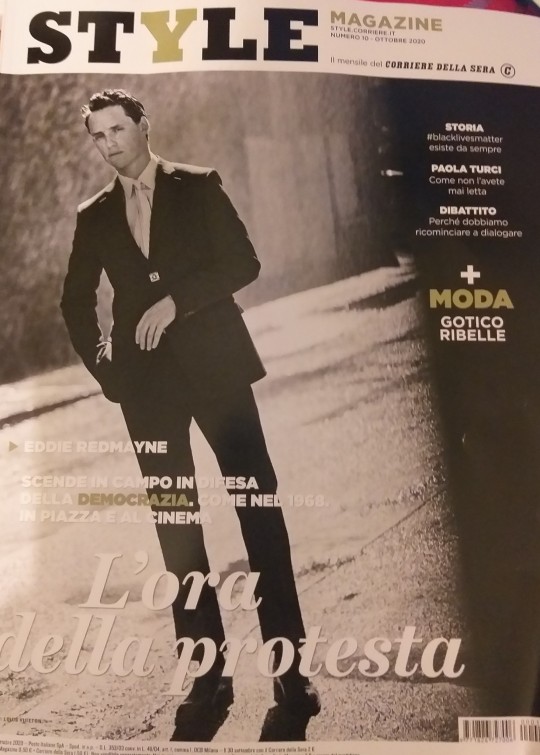

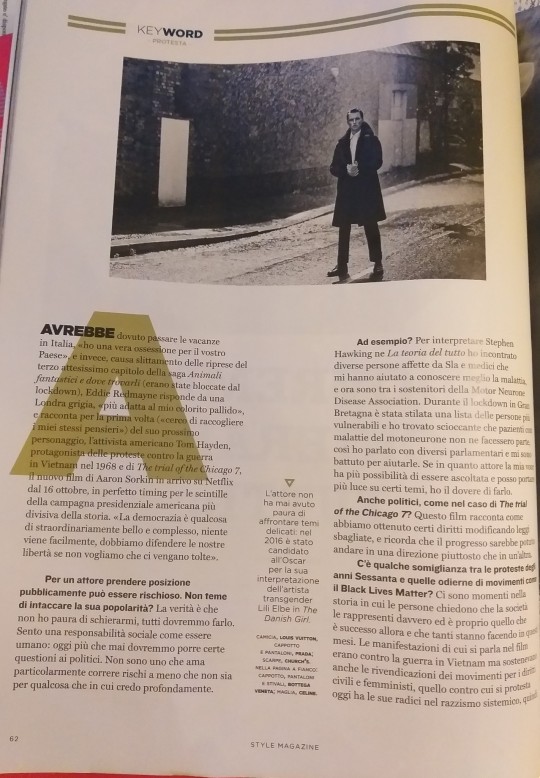
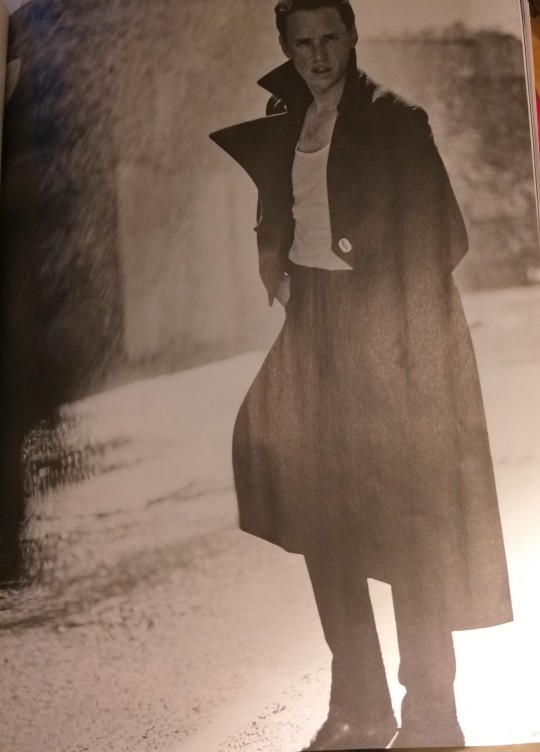
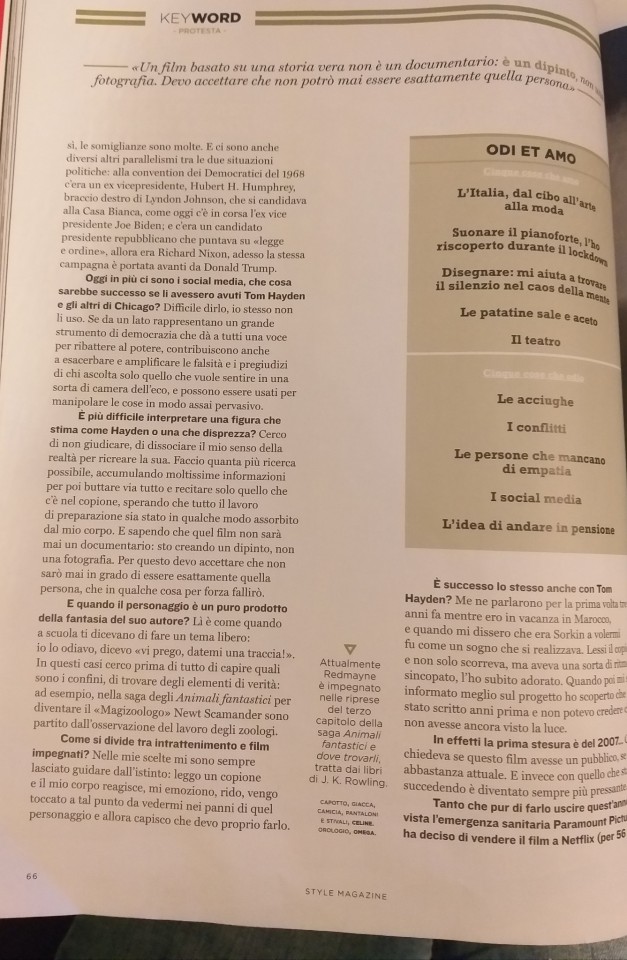
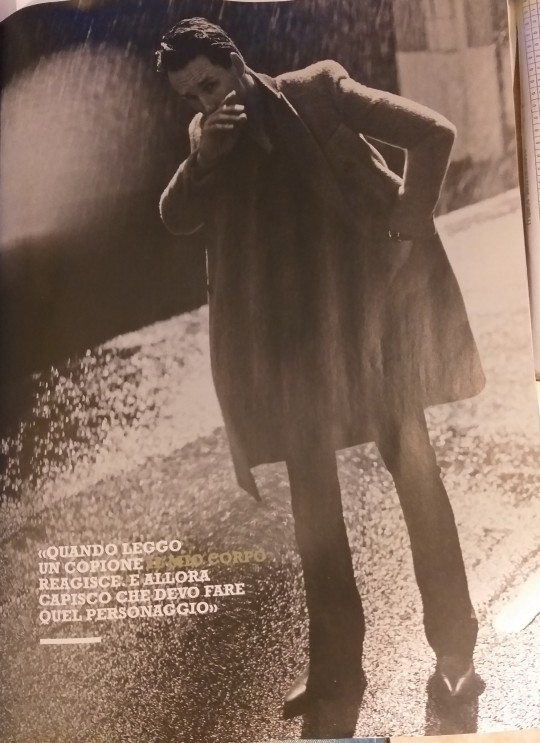
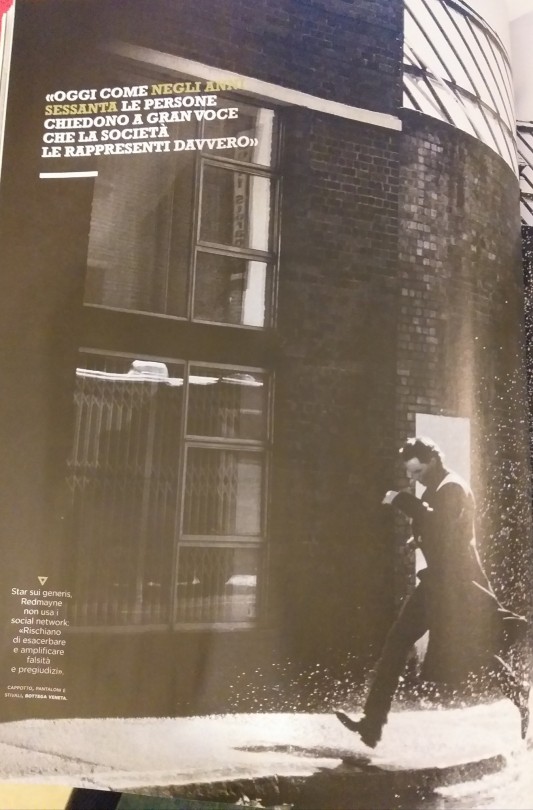

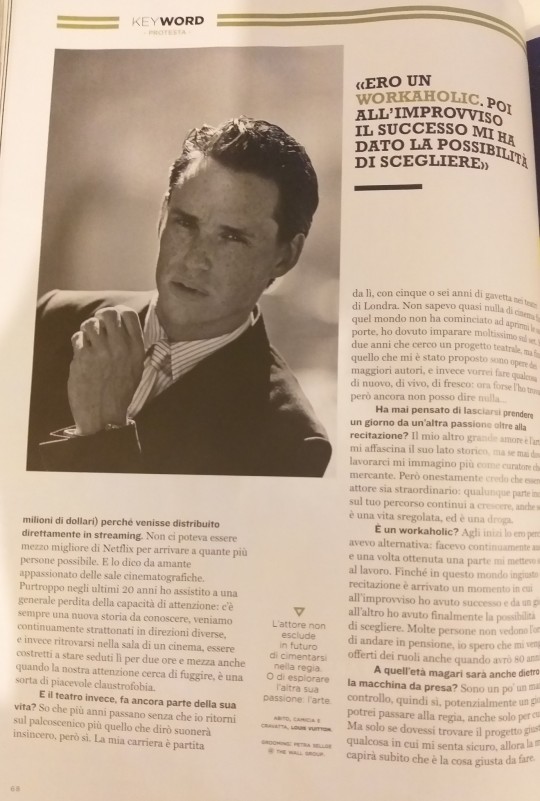
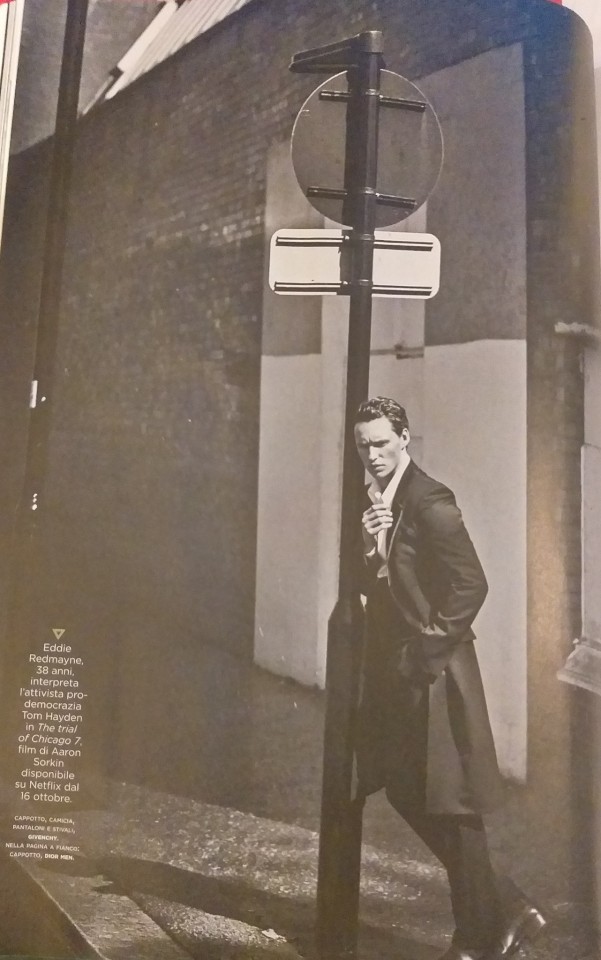
Eddie's interview from Style Magazine
By Valentina Ravizza
Photo: Boo George
Styling by Fabio Immediato.
Translate by me from Italian to English
HE WOULD HAVE had to spend the holiday in Italy,” I have a real obsession for your country “,Eddie Redmayne responds from a gray London,” more suited to my pale complexion”, and tells for the first time (and I try to collect my own thoughts) of his next character, the American activist Tom Hayden, protagonist of the protests against the Vietnam war in 1968 and 77e trial of the Chicago 7, the new film by Aaron Sorkin, arriving on Netflix from October 16. "Democracy is something extraordinarily beautiful and complex, nothing comes easily, we must defend our freedoms if we don't want them to be taken away from us."
It can be risky for an actor to take a public position, Aren't you afraid to undermine your popularity?
“The truth is, I'm not afraid to take sides, we all should. I feel a social responsibility as a human being: today more than ever we should ask politicians certain questions. I'm not one who particularly likes to take risks unless it's for something I deeply believe in.”
For exemple?
To play Stephen Hawking in The Theory of Everything I met several people affected by ALS and doctors who helped me to learn more about the disease, and now I am among the supporters of the Motor Neurone Disease Association. During the lockdown in Britain was made a list of vulnerable people and I found it shocking that patients with motor neuron disease were not part of it, so I spoke to several politicians and went to help them. As an actor my voice has more chances to be heard and I can bring more light on this topics, I have to do it.
Also politicians as in the case of The Trial of Chicago 7?
This film tells how we got rights by changing wrong laws and remember that progress could have gone in one direction rather than another.
Is there any similarity between the protests of the 1960s and those of movements such as Black Lives Matter ?
There are moments in history when people ask for society to really represent them and that's exactly what happened then and what many people are doing in these months. The demonstrations mentioned in the movie were against the Vietnam war, but also supported the claims of the civil rights and feminist movements, the one against which they are protesting today has it’s roots in systemic racism, so the similarities are many.And there are also several other parallels between the two political situations: at the 1968 Democratic convention there was a former vice president, Hubert H. Humphrey, right-hand man of Lyndon Johnson, who ran for the White House, as today former Vice President Joe Biden is in running, and there was a Republican candidate for president who was betting for “law and order” , then it was Richard Nixon, now the same campaign is being carried out by Donald Trump.
Today there is social media, what would have happened if Tom Hayden and the others from Chicago had it?
Hard to say, myself I don't use them . While they represent a great tool of democracy that gives everyone a voice from the shore to power, they also contribute to exacerbate and amplify the falsehoods and prejudices of those who listen only to what they want to hear, in a sort of echo chamber, and they can be used to manipulate things in a very pervasive way.
Is it more difficult to play a figure you esteem like Hayden or one you despise?
I try not to judge, to dissociate my sense of reality to recreate hers. I do as much research as possible, accumulating a lot of information and then throwing everything away and play only what's in the script, hoping that all the prep work has been absorbed somehow into my body, And knowing that that movie will never be. a documentary: I am creating a painting, not a photograph. For this I must accept that I will never be able to be exactly that person, that in something I will necessarily fail.
And when the character is a pure author’s Fantasy product?
It’s like when you were told at school to make a free written essay: I hated it, I said “please, give me a lead!”, In these cases I try first of all to understand what the boundaries are, to find some elements of truth: for example, in the saga of the Fantastic Beasts to become the "Magizoologist" Newt Scamander I started by observing the work of zoologists.
How is it divided between entertainment and committed movies?
In my choices I have always let myself be guided by instinct: I read a script that my body reacts, I get excited, I laugh, I am touched to the point of seeing myself in the role of that and than understand that I really have to do it.
Did the same happen with Tom Hayden?
They first told me about it three years ago while I was on vacation in Morocco, when told me it was Sorkin who wanted me it was like a dream come true. I read the script and it not only ran , but it had a kind of syncopated rhythm I immediately loved it. Then when I got better informed about the project, I found out that it had been written years ago and I couldn't believe he hadn't seen the light yet.
In fact, the first draft is from 2007.
We wondered if this movie had an audience, if it was current enough.Instead with what’s going it has become more and more pressing
So much so that in order to release it this year, given the health emergency Paramount Pictures has decided to sell the film to Netflix (56 millions of dollars) to be distributed directly via streaming.
There could be no better way than Netflix to reach as many people as possible. And I say this as a passionate cinemas’ lover . Unfortunately in the last 20 years I have witnessed a general loss of attention span: there is always a new story to know, we are constantly being pulled in different directions, and instead find ourselves in a cinema hall being forced to sit there for two hours and half even when our attention tries to escape, it’s a kind of pleasant claustrophobia.
And theater, is it still part of your life?
I know that more years go by without me returning to the stage more what I’ll say l’ll sound insincere, but yes, my career started from there, I spent 5 o 6 years working in London theaters. I knew almost nothing about cinema until that world began to open its doors to me, I had to learn a lot on the set. I’ve been looking for a theatrical project, but so far what has been proposed to me are works by the greatest authors, and instead I’d like do something new, fresh. Maybe I found it, but I still can't say anything.
Have you ever thought of letting yourself be taken one day by another passion besides acting?
My other great love is art, but if I ever have to work on it, I imagine myself more as a curator than as a co-worker. But I honestly think that being an actor is extraordinary: whatever part you encounter on your path continues to grow:although sure it’s a wild life and it's a drug.
Are you a workaholic?
In the beginning I was because I had no alternative: I was constantly auditioning and once I got a part immediately got to work, Until in this unfair world of acting there came a moment when I was suddenly successful and overnight I finally had the opportunity to choose. Many people are looking forward to retirement, I hope I’m offered roles even when I’m 80 years old.
At that age maybe you will also be behind the camera?
I'm a bit of a control freak,so yes, I could potentially one day go directing, even just out of curiosity But only if I had to find the right project, something in which I feel safe,
#eddie redmayne#interviewed#best actor#style magazine#boo george#photographer#valentina ravizza#interview#the trial of the chicago 7#tom hayden#activist#civil rights#the theory of everything#newton scamander#the danish girl#fantastic beasts and where to find them#newt scamander#obe#talent#les miserables#oscar winner#stephen hawking#netflix movie#aaron sorkin#script#director
55 notes
·
View notes